
|
#938 (6/15/22)

|
|
MODERN RECORDS - PART ONE (1945-1949) |
|
THIS ARTICLE IS IN MEMORY OF DAVID SAVIET WHO LEFT US ON OCTOBER 22, 2022.
DAVE CONTRIBUTED TO THIS WEBSITE FOR OVER SIXTEEN YEARS. HE MASTERFULLY RESTORED ALL THE 78-RPM RECORDS' AUDIO, MAKING THEM SOUND GREAT! |
Includes Audio For Forty-Four Songs
(Audio Restored By Dave Saviet - Images Restored By Tony Fournier)
MODERN (MUSIC) RECORDS, located in Los Angeles, was truly a family affair. Jules Bihari was president. His brother Joe Bihari was vice president and another brother Saul Bihari was secretary/treasurer. Sisters Florette, Rosalind, and Maxine had administrative roles in the company. Another brother, Lester Bihari, played only a peripheral role, founding his own record company, Meteor Records, in 1952.
Modern Music Records was formed in 1945, mainly as a supplier of records for the Bihari brothers' juke box operations.
Perhaps another valid reason was to record Hadda Brooks (see the Pittsburgh Post Gazette article further down this page). In any case, similar to the start of Specialty Records with Roy Milton And His Solid Senders, Modern Music was able to flourish because of the great popularity of Hadda Brooks' records.
(NOTE: (From Marv Goldberg 7/3/22) Hadda Brooks and Jules Bihari were having an affair, at least in her early days on the label.)
Modern Music changed their name to Modern Records in late 1947.
Subsidiary label RPM was formed in 1950. Related labels Flair and Crown were started in 1953 and 1954, respectively. All these labels will be covered in this multi-part article.
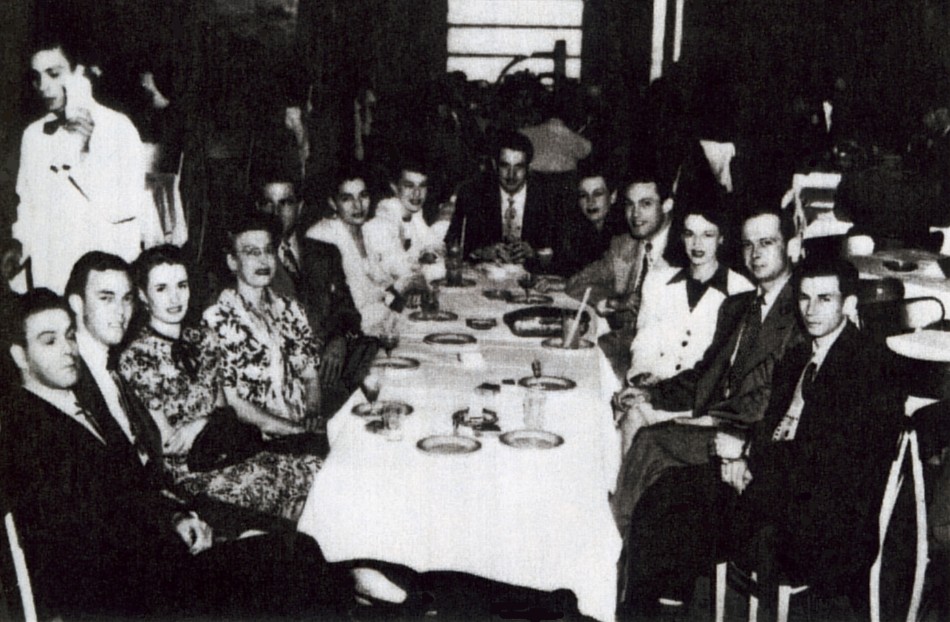
|
Above: The Bihari family dining at Max Rosenbloom's night club, Slapsie Maxie's, in Los Angeles after the launch of Modern Music Records. Jules Bihari (bottom left), Saul Bihari (to his left), and Joe Bihari (bottom right). Are three of the women shown in the photo the afore mentioned Bihari sisters? It looks like Johnny Otis at far end of the table. Can anyone confirm? THE BILLBOARD, April 28, 1945: NEW RECORDING COMPANY STARTS IN LOS ANGELES
LOS ANGELES—A new recording firm, Modern Music Company, has launched activities here with the first of 25 masters being released. The initial release includes "Swingin' The Boogie" and "Just a Little Blusie". Both tunes feature Hadda Brooks, plano: Jimmie Black, alto sax; Al Witchard, drums; and Basie Day, bass.Heading the firm is Jules Bihari, who for a number of years was associated with the juke box business with Jay Bullock. Bullock is still in the music box business and he and Bihari are still associated in other activities.
According to Bihari, Modern will release records from time to time. On the first release Hadda Brooks is given credit. On the subsequent releases Miss Brooks and the others will share billing.
Bihari said that the releases he has made up to this time allow the musicians full range of interpretation. "They play what they want and how they want" he said. "In the future it is possible that written tunes will be used". For now, the records are instrumental and no vocal choruses are featured.
CASH BOX, January 24, 1948: MODERN RECORDS ARE BASED AROUND JUKE BOX BUSINESS
At Left: Saul Bihari, Vice-President, Modern Records, Inc.
The first thought and final theme of a recording session at the Modern Records plant in Hollywood is based and built completely around the juke box operator. This may seem just a little prejudiced, but Jules and Saul Bihari gained most of their knowledge of the record business through their own experience as juke box operators over a period of eight years, just before embarking on their venture into the record manufacturing field.
Actually knowing what it takes to draw a coin into a juke box slot and actually producing the same on records, calls for a combination of talent. However, the basis of all good recordings, which includes the manufacturing, promotion and actual sale of the record, is the sincere and earnest endeavor to produce a record which is adaptable to public taste; and to have an inner knowledge and understanding of the people for whom the music is produced.
The constant demand for a good wearing quality in a recording is uppermost in mind and all emphasis are on this particular phase. So comes the rare quality of the true combination of music artistry, manufacturing and production of records.
The record outlook for Modern in 1948 is one to be watched. Altho a very young company, their rapid expansion and development in the competitive industry of record manufacturing has now gained them their share as one of the largest and most progressive independent recording companies of today.
Their backlog of recordings on such rising stars as Hadda Brooks, Johnny Mooreís Three Blazers, Gene Phillips, Little Willie Jackson, and a full roster of other stars, hold some very outstanding recordings for the coming year.
Evidence of Modernís close cooperation with the automatic music industry is easily seen in the recent "Cash Box Second Annual Music Poll Of The Automatic Music Industry". Hadda Brooks, one of the top female vocalists of the nation held a position of high merit throughout the entire poll, and the large amount of votes she accounted for certainly is evidence of our position in the field.
(NOTE: The "our" in the last sentence above seems to be a giveaway that this article was written by Saul Bihari.)
HADDA BROOKS: Hadda Brooks, "Queen Of The Boogie Woogie", was a singer, composer, and pianist. She was the first artist to record for Modern Music Records. The early sides featured boogie woogie piano instrumentals, later on adding vocals to her songs. She continued making very successful records for the label until leaving in 1949 due to a royalties dispute.
Hadda moved to London Records (1950-1951) and then Columbia's subsidiary OKeh (1952-1954) before returning to Modern/Crown in 1956.
From 1947 to 1952, she appeared in three movies singing and/or playing the piano. Most notable is the 1950 movie, "In A Lonely Place", starring Gloria Grahame and Humphrey Bogart (see still shot at right).
In 1957, she hosted her own TV show, "The Hadda Brooks Show", in which she sang and played the grand piano (episodes available at YouTube).
In 1993, Hadda received the Rhythm And Blues Foundation Pioneer Award.
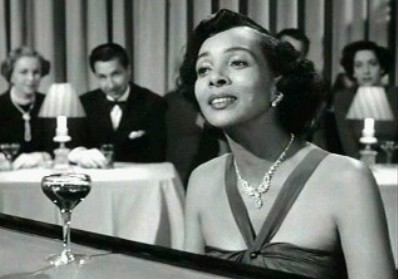
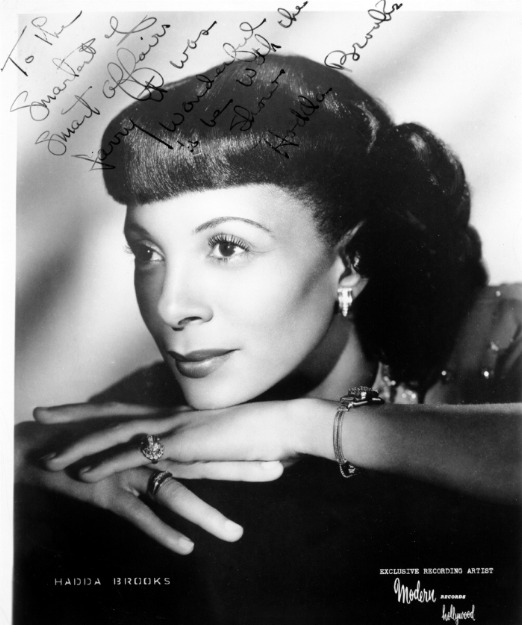
|
Above: Photo of Hadda Brooks, exclusive recording artist for Modern Records Hollywood.
THE BILLBOARD, April 24, 1948: HADDA BROOKS
Two and a half years ago, a small Hollywood indie diskery was just starting in biz. The firm, Modern Records, signed as one of its first artists a relatively unknown gal, Hadda Brooks. Event proved lucky for all concerned for today Miss Brooks has become the "Queen of the Boogie" and grown in popularity until the gal tops sales of all Modern artists.Hadda's first disk click was "Polonaise Boogie" which was released simultaneously with the pic, "Song To Remember"(*see note below). Modern followed this hit with six sides of modernized boogies. Later, "That's My Desire" and "Don't Take Your Love From Me" also scored.
At Right: MODERN MUSIC 1946 CLIPPING. (NOTE: The "B" side, "Polonaise Boogie", gets top billing.)
LISTEN (Windows Media Player): [Audio restoration by Dave Saviet.]
"Polonaise Boogie (Instrumental)" - Hadda Brooks - Modern Music 123B - 1946.The Brooks gal was already set as a piano stylist when she took to vocalizing during a vaude stint at Los Angeles's Million-Dollar Theater in 1946. Success was immediate, setting the pattern for her future vocal-piano sides.
Vaude and personal appearance stints, coupled with solid record releases followed, bringing her income and box-office draw up steadily. She has completed one pic at Eagle-Lion Studios and is skedded for other film roles when she returns to Hollywood from her present personal appearance tour.
Miss Brooks's record mentors, Jules and Saul Bihari, of Modern, point to her popularity on personal appearance tours as proof that gal's peak fame is still to come. During a recent personal stint in Washington, fans clamoring to catch the act were so thick outside the theater box-office that police were needed to keep order.
Managed by Phil Bloom Agency.
(*NOTE: The 1945 movie "A Song To Remember" stars Paul Muni, Merle Oberon, and Cornel Wilde. It is about the life of classical composer Chopin, who wrote "The Polonaise" for solo piano, one of his most admired compositions. The flip of Hadda Brooks' "Polonaise Boogie" is "Polonaise" done in classical style.)
PITTSBURGH POST GAZETTE, April 28, 2002:
(Excerpts from the obituary) ....Hadda Brooks' first single, the hit "Swingin' The Boogie", in 1945, launched not only her career, but Los Angeles-based Modern Records, which became the West Coast's premier postwar R&B label. As a singer in the late 1940s and '50s, Miss Brooks scored hits such as "Trust In Me", "Don't Take Your Love From Me", and "Dream".She also sang in several films and, in the early 1950s, became the first black entertainer to host a television variety show, which aired on Channel 13 in Los Angeles....
At Right: THE BILLBOARD—DECEMBER 7, 1946. "Queen of the Boogie"
She was born Hadda Hopgood in Los Angeles in 1916. At age 4, she begged her parents (her mother was a doctor, her father a deputy sheriff) for piano lessons. She later studied classical music.
In 1941, she married Earl "Shug" Morrison, who played for the Harlem Globetrotters. But Morrison died of pneumonia within a year.... She worked as a rehearsal piano player in tap-dance coach Willie Covan's studio, where the clients included Gene Kelly, Fred Astaire, and Eleanor Powell. Although Miss Brooks often frequented blues clubs, she had no show-business aspirations.
That changed in 1945, when a jukebox repairman named Jules Bihari heard her rehearsing in a downtown music store for a children's dance troupe. "I was trying to get a whole bunch of different rhythms from 'The Poet And Peasant' overture" Miss Brooks recalled. "I got the waltz and rumba, and I was trying to get the boogie down.
There was a man standing near me while I was playing, and he asked me if I could do a boogie. I said 'Well, I'm trying'. And he said 'I'll give you a week. If you can work up a boogie, I'll record it. I have $800, and if it goes, then we're in business. If it doesn't go, I've lost $800". Bihari, who gave Miss Brooks her stage name, parlayed his $800 investment into Modern Records, which went on to record other artists such as B.B. King and Etta James.
In 1947, Miss Brooks was appearing with the Charlie Barnet Orchestra at the Million Dollar Theater in downtown Los Angeles. Barnet asked what she'd do if she got an encore. When she answered "Another boogie". Barnet said "Why don't you sing and break the monotony?" At the next show, Miss Brooks sang "You Won't Let Me Go", which became her first vocal recording. She recorded for 12 years with Modern, London Records, and Columbia's Okeh label.
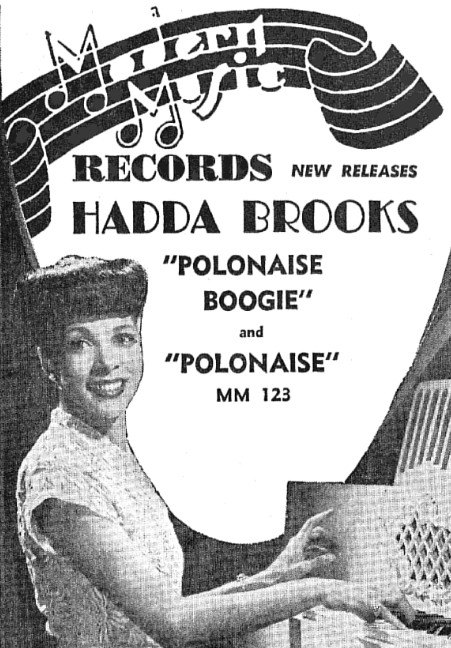
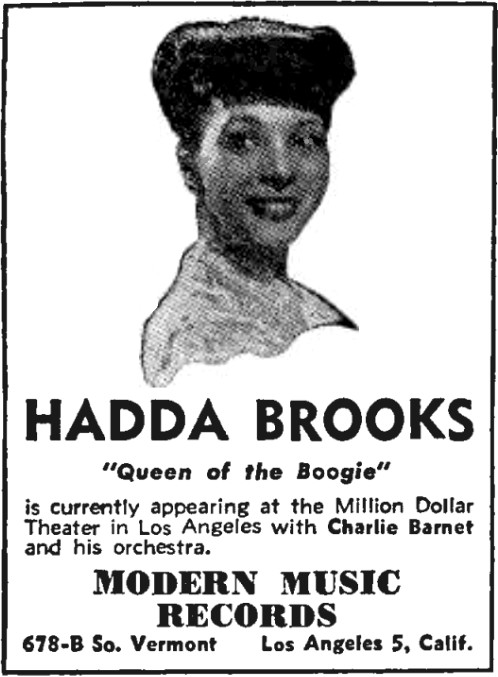
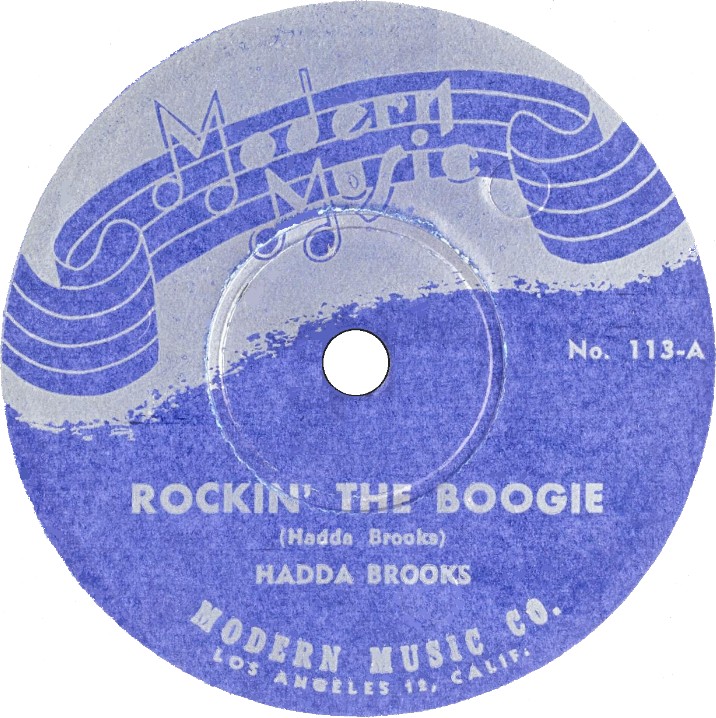
|
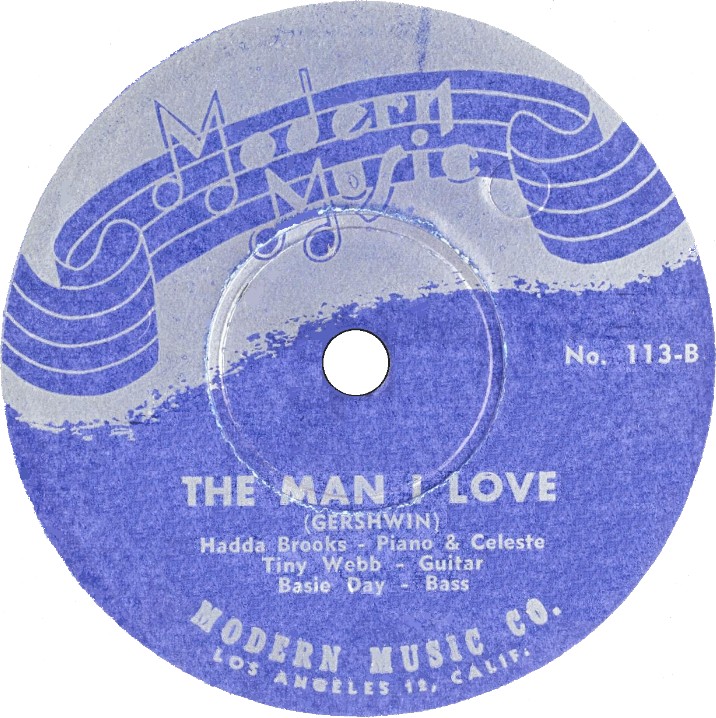
|
Above: Label images for both sides of Modern Music 113-A/B, released in 1945. Both sides are instrumentals. Hadda plays both the piano and celeste on the "B" side. The celeste, aka "celesta", is a piano-like instrument where metallic bars are struck to produce a chimes-like sound. The name celeste is derived from the French word for "heavenly". AFRO-AMERICAN, October 11, 1947:
BALTIMORE—Many movie actresses have entered films via the stage, the radio, beauty and popularity contests, from jobs as waitresses, elevator operators, and counter clerks. But Hadda Brooks, Modern Records No. 1 star, is probably one of the few to scale the portals of Hollywood on a phonograph record as a magic carpet.It happened this way: Director Leigh Jason, at work one night studying the script of his then forthcoming Eagle Lion film, "Out Of The Blue", was unable to concentrate on the job at hand. A neighbor's phonograph kept playing repeatedly a recording of "That's My Desire". Jason called on the neighbor, a total stranger, introduced himself and, to insure no further interruption of his skull practice, bought the record — and phonograph. Weeks later, while seeking a vocalist to sing the film's title theme song, Jason suddenly recalled the record he'd heard. He phoned Mrs. Jason at home, had her play the disc while he listened over the phone.
The voice was just the sort he was seeking. Subsequent inquiry elicited information from the Modern Record Co., makers of the platter, that the soloist was Hadda Brooks. Eagle Lion contacted Miss Brooks and signed her for an appearance in "Out Of The Blue", her first picture.
Coincidentally, Miss Brooks is currently playing Baltimore's Royal Theatre, while her new picture is having its premiere in a downtown theatre; her recordings topping the week's juke box parade and record stores' sales.
Born in Los Angeles, of non-professional parents, Hadda graduated from the University of Southern California with a B.A. degree in music. She made her debut as a vocalist at the Million Dollar Theatre in Los Angeles with Charlie Barnet's orchestra in 1946, going from there to Theatre Club, Oakland.
She has made frequent appearances on the air with Rudy Vallee and Jerry Lester at the Club Copacabana in San Francisco, and with Lionel Hampton, Erskine Hawkins, Frank Bull and others. Her recording, "Bully Wully Boogie", has been adopted as the theme song of disc-jockey Bull's fan organization, the KFWB Bully Wully Club, membership in excess of 100,000.
Her first recording was "Swinging The Boogie". Her most popular, "That's My Desire", has sold more than a half-million copies.
Following completion of her role in "Out Of The Blue", she is currently on a nation-wide tour, her first time East, appearing at the Harlem Apollo Theatre, Washington's Howard and now the Baltimore Royal. Her party includes her personal manager, Joe Bihari, and a secretary, Winnie Brooks [Hadda's sister], graduate of Howard and Columbia universities. She will be at Chicago's Regal, Detroit's Paradise, back to Hollywood and a stint at Club Chanticlaire, and back to NYC for an engagement at the Copacabana.
Hadda is one of the few discoveries to begin at the top of the ladder. Her first professional engagement was at $1000 per week, and in less than a year it soared to $1500. She received $4500 for her work in "Out Of The Blue" in which she does one scene with Ann Dvorak. She considers this role "a wonderful break" and Miss Dvorak, a very democratic person. She still has commitments with Columbia Pictures and Eagle Lion for additional films.
In discussing the battle of the hemlines, Hadda says she's in sympathy with the men, "but women must keep up with the style if they are to be well dressed". One of her hobbies is clothes and she really wears them. She has 15 gorgeous costumes hanging in her dressing room backstage at the Royal.
She prefers Hollywood to the East. "You get better opportunity there and you don't face so many embarassing situations", she said. She was burning somewhat when she said that, following the refusal of a downtown Baltimore store to allow her secretary to try on a dress. "I don't get it" she said.
Her favorite recording is "Polanaise Boogie", from which her royalties to date have passed the $20,000 mark. While she is the top feminine recording artist, there's more on her mind. She's 23 years of age and single, and her greatest ambition is to "become a normal housewife". When asked if she had a real heart interest, she replied, "could be". She's five feet, five inches, weighs 124 pounds, has black hair and brown eyes. Thus far, she hasn't lost her equallibrium, is easily approached, and wants people to like her.
In addition to clothes, her other hobbies are swimming and dancing. She plays the organ for her own amusement and delights in rendering boogie-woogie versions of the classics. She lives in Los Angeles with her mother, and an older sister, and a pet cocker spaniel, Bully Wully.
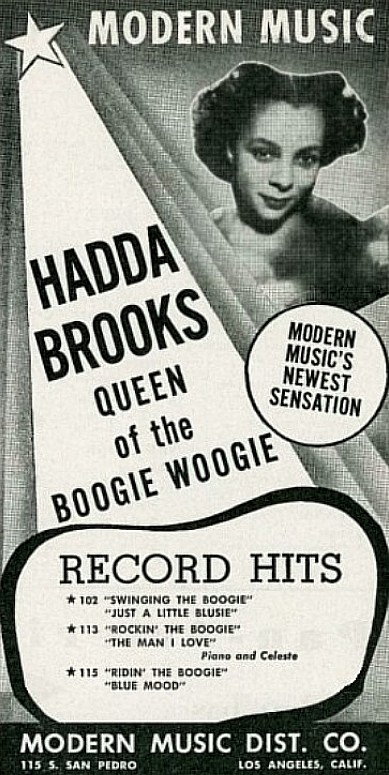
THE BILLBOARD 1945-1946 MUSIC YEAR BOOK
The Billboard Review (8-18-45):
HADDA BROOKS — Modern Music 113LISTEN (Windows Media Player): [Audio restoration by Dave Saviet.]
Rockin' The Boogie/The Man I Love
Whipping the keyboard with a highly commercial eight-to-the-bar kick, Miss Hadda Brooks interpolates it light and breezy for "Rockin The Boogie" a blues boogie. While there is no individual spark in her boogie style, gal keeps the beat moving along.In contrast, and with much less spontaneity, is her parlor playing, interspersed with celeste fingering, of the Gershwin ballad, "The Man I Love". Assist from guitarist Tiny Webb and bassist Basie Day hardly enough to cloak the mediocre needling. Nothing here that makes for solid juke box spinning.
1. "Rockin' The Boogie (Instrumental)" - Hadda Brooks - Modern Music 113-A - 1945.
2. "The Man I Love (Instrumental-Celeste)" - Hadda Brooks, Tiny Webb, Basie Day - Modern Music 113-B - 1945.BOTH SONGS played in sequence.
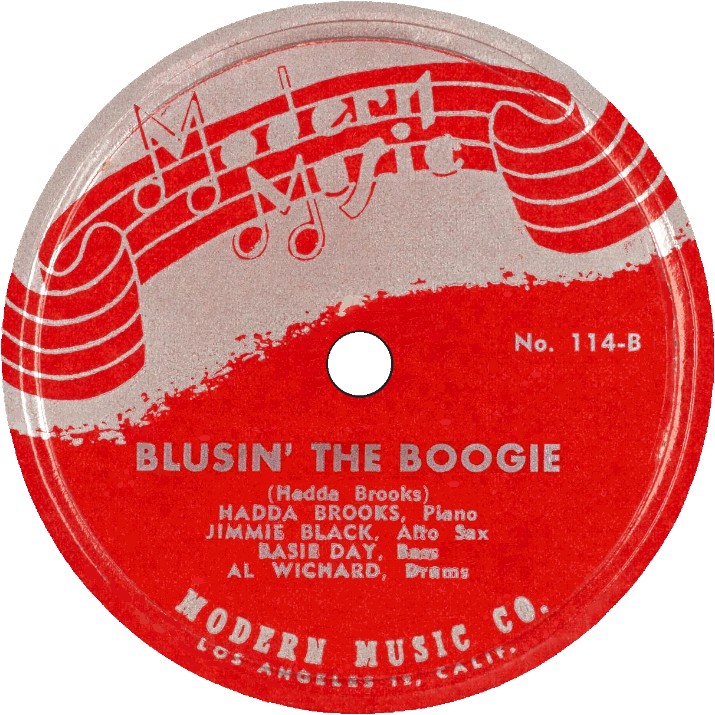
|
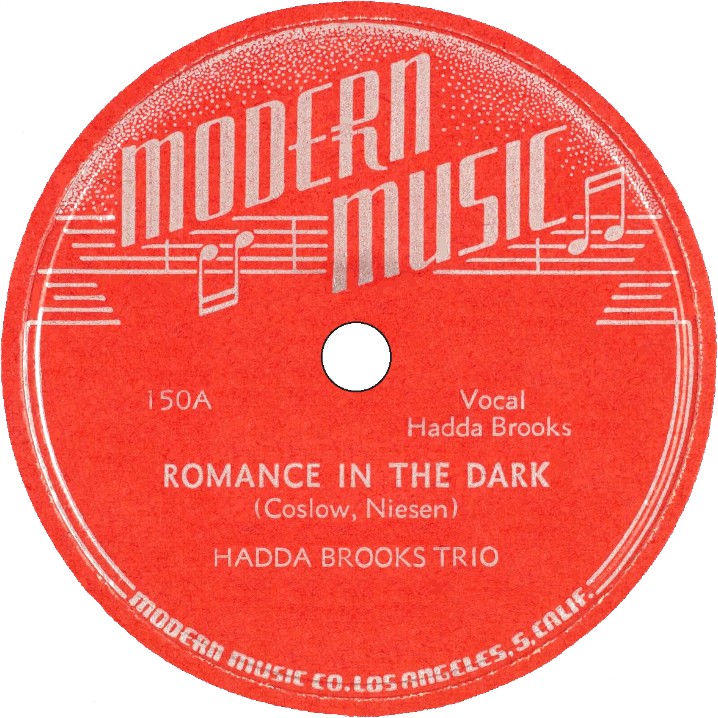
|
Above Left: Label image of Modern Music 114-B, recorded and released in 1945. This side is an instrumental. The flip side of this record is by Pearl Traylor and is included further down this page under her name. The Modern Music label numbering system started with No. 101. Above Right: Label image of Modern Music 150A, recorded in 1946 and released in 1947. This side has Hadda Brooks both vocalizing and playing the piano. The composer credits on the label are for a different "Romance In The Dark" song.
The song Hadda sings here was written by Lil Green and Big Bill Broonzy. The side by Hadda was re-issued in 1952 on the red "Modern Hollywood" label format, but still with the same incorrect composers credited.
The Billboard Review (6-28-47):
HADDA BROOKS — Modern Music 150
Romance In The Dark
With guitar, bass, and drum supporting her own Steinway dusting, Hadda Brooks chants in a light and appealing manner. The Brooks brand of fine rhythm singing is displayed for Romance in the Dark. This side holds race juke profits.Modern Records re-issued Hadda's "Romance In The Dark" in 1952. Here is the Cash Box Review at that time....
Cash Box Review (3-29-52):HADDA BROOKS TRIO — Modern Records 861LISTEN (Windows Media Player): [Audio restoration by Dave Saviet.]
Romance In The Dark
The Hadda Brooks Trio takes a slow tune for a mellow spin around the wax. Hadda Brooks does a sweet job on the lovely tune as she sells the romantic lyrics with warmth.
1. "Bluesin' The Boogie (Instrumental)" - Hadda Brooks - Modern Music 114-B - 1945.
2. "Romance In The Dark" - Hadda Brooks Trio - Modern 150A - 1947.BOTH SONGS played in sequence.
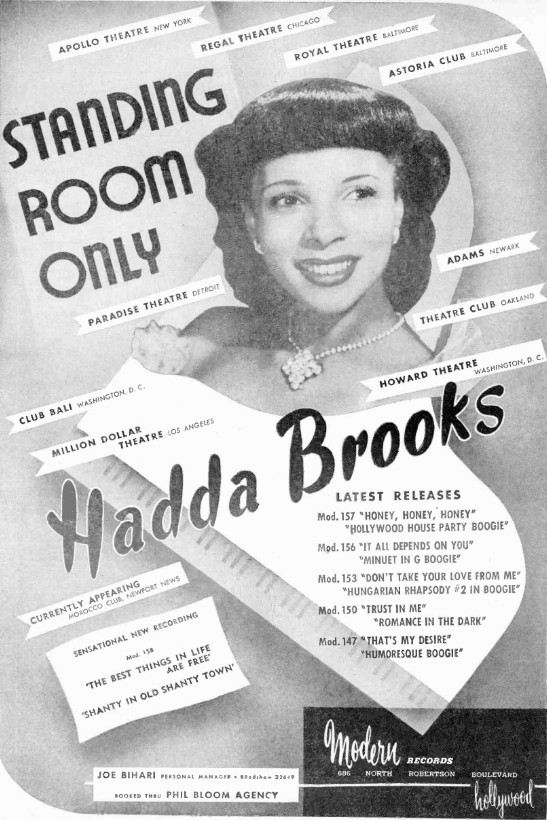
|
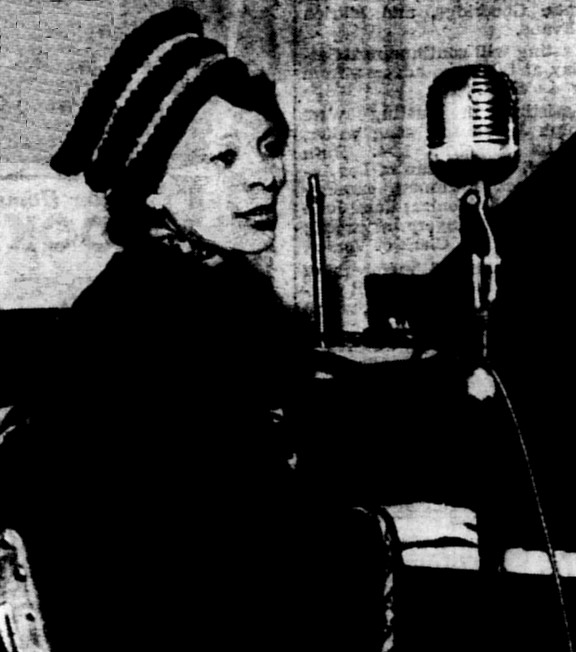
|
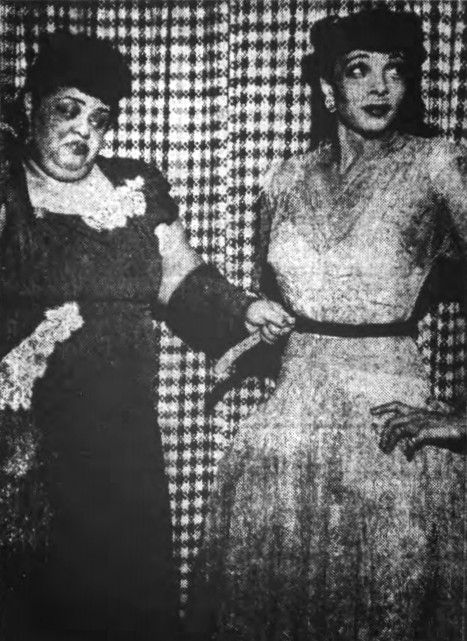
|
Above Left: CALIFORNIA EAGLE, December 11, 1947:
HADDA BROOKS, popular recording artist recently returned from the East, was one of the guest artists at the West View Benefit Fashion Revue held Nov. 30 at Club Alabam. Miss Brooks has appeared on several benefit programs for West View Hospital, and, as usual, she left the audience clamoring for more.
(NOTE: As proven by several newspaper articles, Hadda commonly made herself available for such community activities.)Above Right: PITTSBURGH COURIER, November 15, 1947:
CHEER UP, JUNE—When singers meet they usually talk about songs, but here Hadda Brooks and June Richmond compare waistlines. June doesn't seem to believe that Hadda's wasp waist is according to Hoyle. At any rate both girls rate high on the list of favorite singers.
(NOTE: Hilarious photo! What a card June must have been to happily go along with the joke.)
NOTE: It can't be emphasized enough how vital Hadda Brooks was to Modern Music Records' early success. More Hadda is coming in Part Two of this article.
EXTRA RECORDS — ROMANCE IN THE DARK: "Romance In The Dark" was composed by Lil Green and Big Bill Broonzy. The song was first released by Lil Green on the Bluebird label in 1940.
LISTEN (Windows Media Player): "Romance In The Dark" - Lil Green - Bluebird B-8524-A - 1940.
Hadda Brooks' version of the song is further up on this page. The artists featured in this section are Mabel Robinson And The 4 Blackamoors (1941), Sarah McLawler (1952), and The Diamonds (1953).
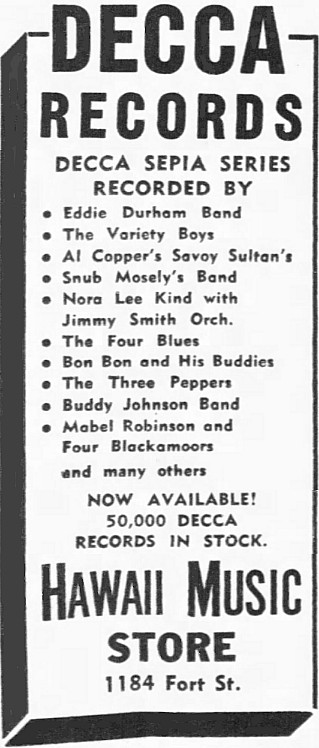
|
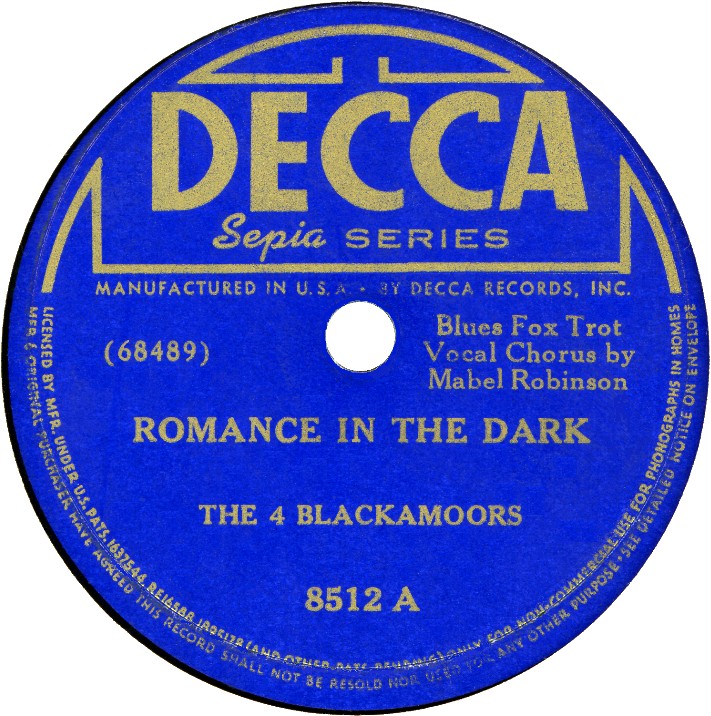
|
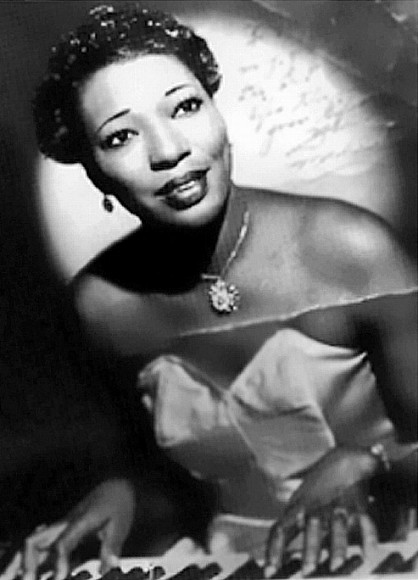
|
Above Left: HONOLULU STAR BULLETIN, April 16, 1943. Above Middle: Label image of Decca 8512 A, recorded on December 12, 1940 and released in 1941. No composer credits are shown on the label. The Four Blackamoors had four releases (seven sides), all on Decca, all in 1941.
Above Right: Photo of Mabel Robinson, the vocalist and pianist on this side of the record.
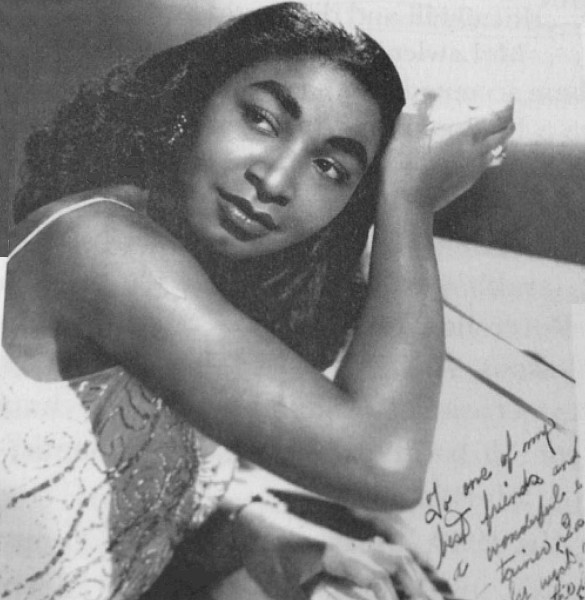
|
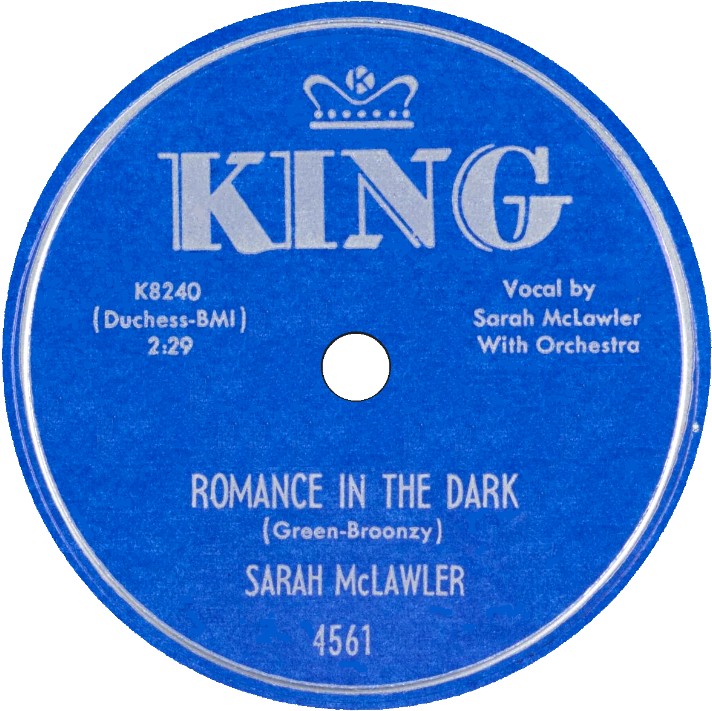
|
Above Left: Photo of Sarah McLawler, from Chicago, was a singer, pianist, organist, and band leader. She was with King Records in 1951-1952. This resulted in at least four records for them, some of these sides with vocal group backing and some with the self-contained vocal/instrumental group, The Syncoettes.
Above Right: Label image of King 4561 , recorded and released in 1952.
Cash Box Review (9-20-52):
SARAH McLAWLER — KING 4561
Romance In The Dark (B+) Here is tender disking with the thrush projecting her personality in full force. This is a platter with hit potential.
(NOTE: A rating of B+ was considered as "excellent".)The Billboard Review (9-27-52):
SARAH McLAWLER — KING 4561
Romance In The Dark (77) A good ballad is wondertully teamed with Miss McLawler's chirping ability. Fine wax.
(NOTE: Ratings had a range of 0-100 with 70-79 considered as "good".)
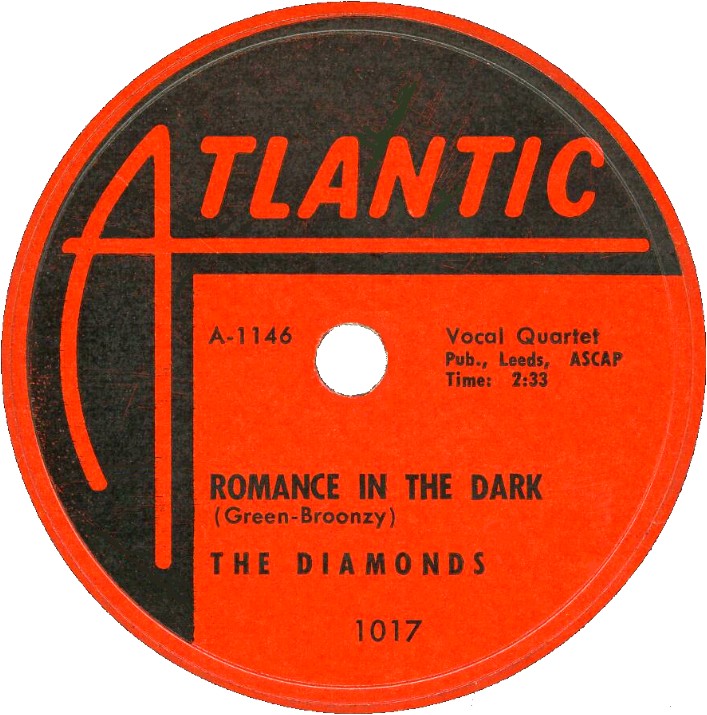
|
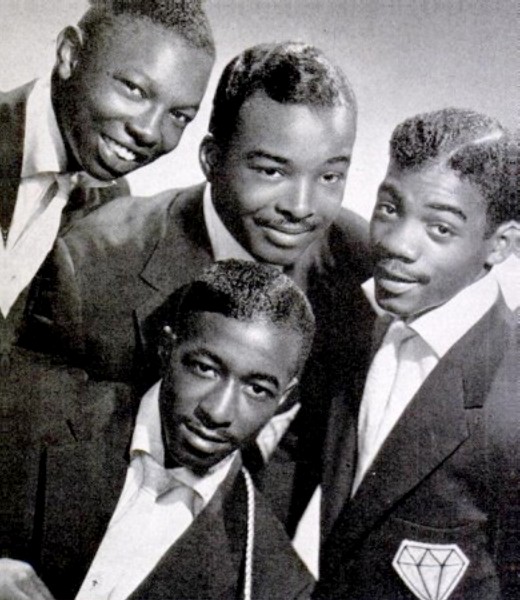
|
Above Left: Label image of Atlantic 1017, recorded on November 5, 1953 and released in December of that year.
It is The Diamonds' third of three records, all on Atlantic (1952-53).Above Right: Photo of The Diamonds, (Top L-R) Harold "Sonny" Wright, Daniel Stevens (Stephens?), Myles "Mousey" Hardy, and (Bottom) Ernest "Rocky" Ward. They chose an ideal name for their group. Note the large diamond emblem on the suit jacket's pocket.
JET MAGAZINE, October 1953: TEEN-AGED N.Y. QUARTET TO TOUR CANADA
The Four Diamonds, a group of talented Harlem youngsters who parlayed two amateur contest prizes into a recording contract and a series of Canadian engagements, are one of the youngest professional quartets in show business.(The group) is scheduled to start a five-week Canadian tour this week.... The youths, who had been singing in church choirs and YMCA glee clubs, first met at a Harlem YMCA jam session.
They later won two first prizes at Apollo Theater amateur shows, turned professional, and waxed two records on the Atlantic label.
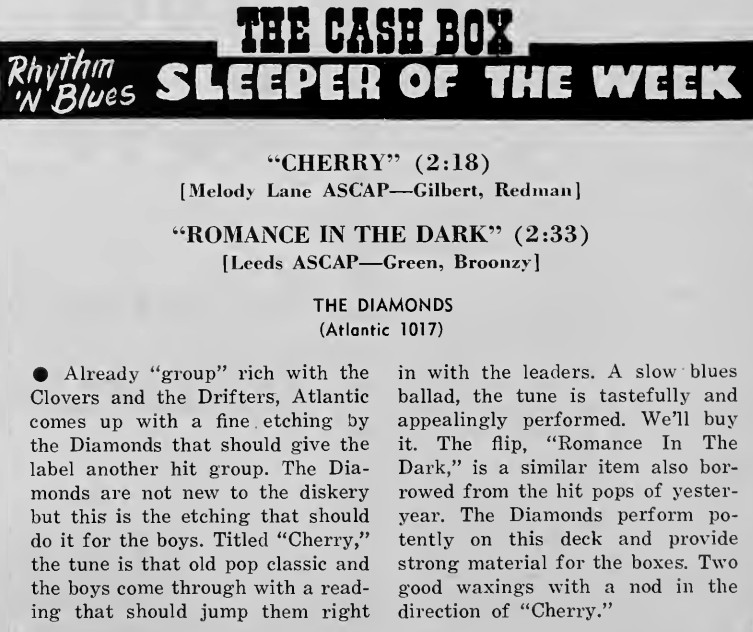
|
The Billboard Review (12-19-53):
THE DIAMONDS — ATLANTIC 1017
Romance In The Dark (71) A first-rate lead tenor voice sparks the quartet reading of the lovely ballad. Good listening.
(NOTE: Ratings had a range of 0-100 with 70-79 considered as "good".)LISTEN (Windows Media Player): [Audio restoration by Dave Saviet.]
1. "Romance In The Dark" - The 4 Blackamoors (Vocal By Mabel Robinson) - Decca 8512 A - 1941.
2. "Romance In The Dark" - Sarah McLawler - King 4561 - 1952.
3. "Romance In The Dark" - The Diamonds - Atlantic 1017 - 1953.ALL THREE SONGS played in sequence.
PEARL TRAYLOR: Not much information could be found about Pearl Traylor. She was a singer, piano player, and composer. She played boogies somewhat in the style of Hadda Brooks, which is perhaps why Modern Music wanted to record her.
Pearl had four records on Modern Music (two of these were her on one side only) released in 1945-1946, the first two years of the label's existence. There was also one record by her on the OKeh label (1951), a subsidiary of Columbia Records.
If anyone can provide a photo or more information about Pearl Traylor, please contact me.
THE BILLBOARD, May 24, 1950:
....Sam Lane has re-organized his International Records. Lane, who operates a recording studio in Hollywood, has discovered a number of artists whom he has been turning over to other labels, including Pearl Traylor (Columbia)....THE BILLBOARD, July 15, 1950: L.A. DISKERY SETS EXPANSION PLAN
LOS ANGELES—Expanding its operation and aiming particularly at the juke box trade, International Records has connected with Ivan Ballen, of Gotham Records, Philadelphia, for pressings and eastern distribution, Sammy Lane, International owner, said....Specializing in rhythm and blues records, Lane said that Pearl Traylor had recently cut eight sides for the International label. Mickey and the Flames are now in the process of making eight sides for early release.
AT Right: CALIFORNIA EAGLE, March 16, 1944.
NOTE: Unclear what "K.M.T.R." represents. The radio station KMTR is located in Eugene, Oregon.
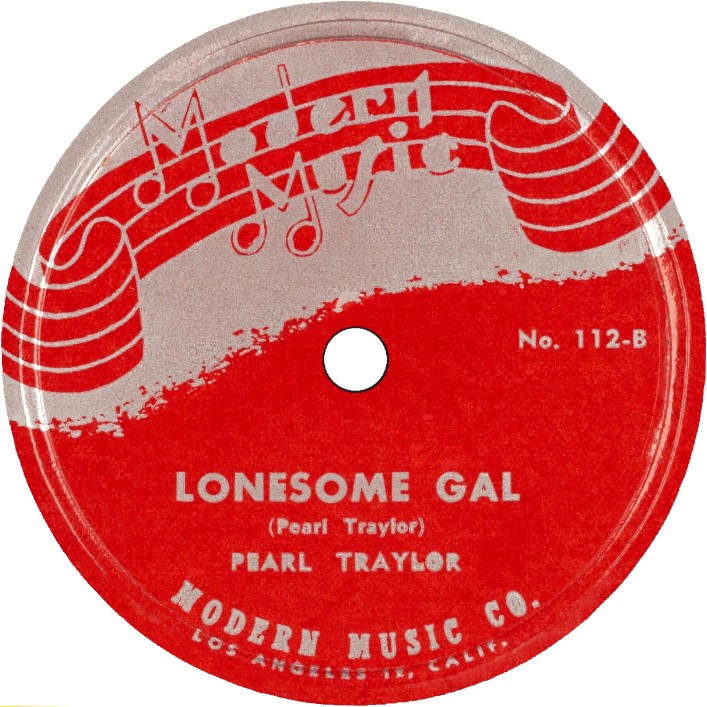
|
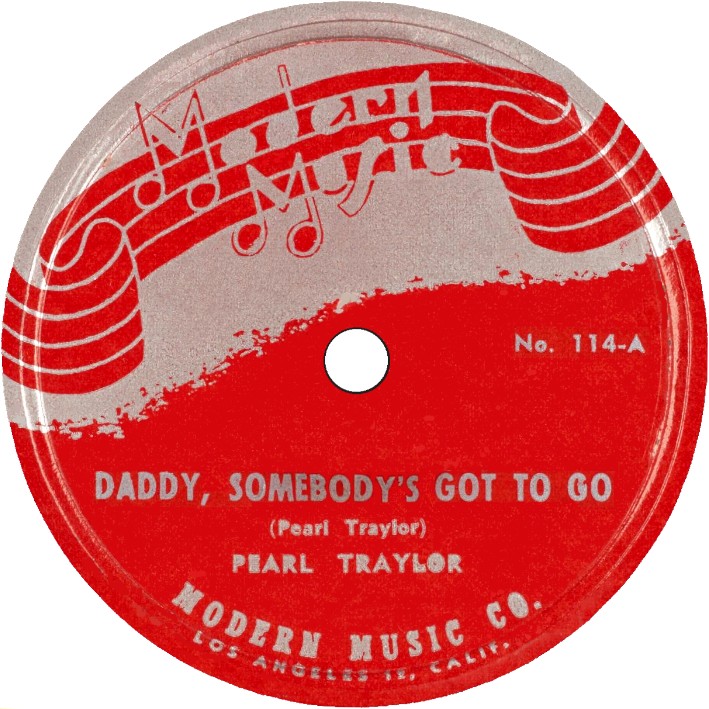
|
Above Left: Label image for Modern Music 112-B, released in 1945. The flip-side is "Nightmare Boogie", an instrumental. Pearl Traylor is credited as composer on both of the above labels. The "Nightmare Boogie" label does not show a composer. Above Right: Label image for Modern Music 114-A, also released in 1945. The flip-side of this record is by Hadda Brooks and is included in her section further up on this page.
LISTEN (Windows Media Player): [Audio restoration by Dave Saviet.]
1. "Lonesome Gal" - Pearl Traylor - Modern Music 112-B - 1945.
2. "Daddy Somebody's Got To Go" - Pearl Traylor - Modern Music 114-A - 1945.BOTH SONGS played in sequence.
EXTRA RECORD — PEARL TRAYLOR:
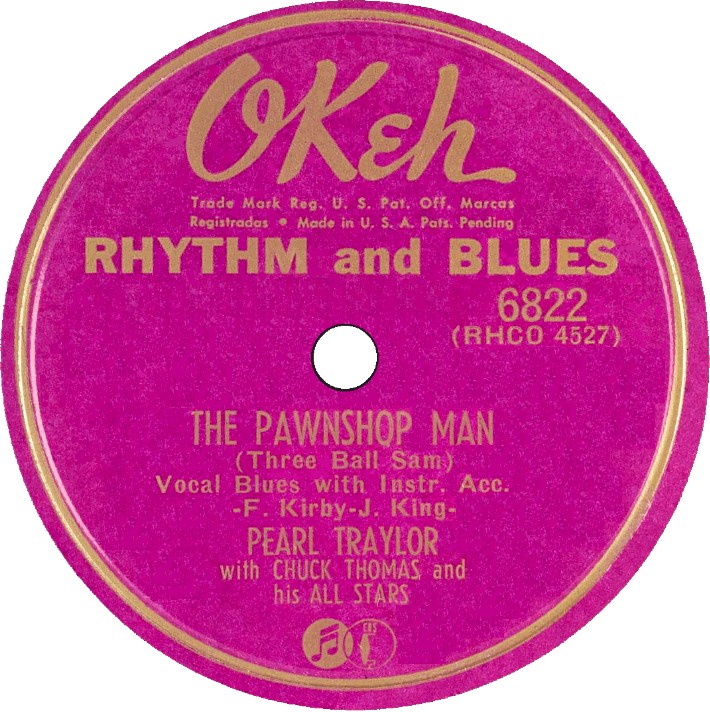
|
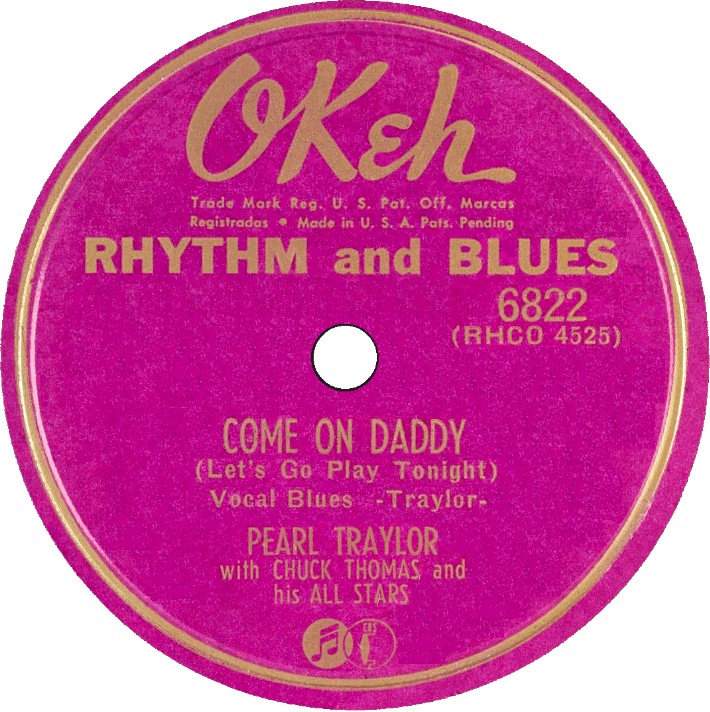
|
Above: Label images for both sides of of OKeh 6822, recorded in June/July 1951 and released in 1951. The label distinctly denotes that this record is "Rhythm And Blues". This appears to be Pearl Traylor's only record on the OKeh label. "The Pawnshop Man" is clearly a double-entendre song, this one on the vulgar side. Pearl is credited as composer on the "Come On Daddy" label.
The Billboard Review (10-6-51):
PEARL TRAYLOR — OKEH 6822
The Pawnshop Man (67) Tasteless material gets a fair vocal from thrush, tho her chanting has insufficient presence here. Backing is free-for-all slow Dixie, which detracts.
Come On Daddy (60) Faster tempo blues has little in the singing or playing to recommend.
(NOTE: Ratings had a range of 0-100 with 60-69 considered as "satisfactory".)LISTEN (Windows Media Player): [Audio restoration by Dave Saviet.]
1. "The Pawnshop Man" - Pearl Traylor - OKeh 6822 - 1951.
2. "Come On Daddy" - Pearl Traylor - OKeh 6822 - 1951.BOTH SONGS played in sequence.
THREE BITS OF RHYTHM: THE BILLBOARD 1943 MUSIC YEAR BOOK: THREE BITS OF RHYTHM
One of the oldest colored units in the business, featuring comedy, novelty, and swing. The boys have done remarkably well in the cocktail field as well as on Decca records.Unit includes Brucie Williams, guitar; Theodore Rudolph, bass and vibes; and Saul Langemour, guitar.
They have appeared for two consecutive years at the Capitol Lounge, Chicago, and one of their more recent jobs is the Alpine Musical Village, Philadelphia.
THE BILLBOARD 1944 MUSIC YEAR BOOK: THREE BITS OF RHYTHM
This lively trio is one of the finest colored units In the business. They consist of Brucie Williams, guitar; Theodore Rudolph at the vibes and bass; and Saul Langemour, guitarist.In edition to their musical accomplishment they also have a good flare for comedy. Clever novelties are combined with their good style of swing music.
Recently they have been working as an act in floor shows at the Grand Terrace, Detroit. and the Club Algerian, Denver. Prior to that they worked two consecutive years at the Capitol Lounge, Chicago.
At present they are appearing at Lindsay's Sky Bar, Cleveland.
Click HERE for an article about The Three Bits Of Rhythm by Marv Goldberg. (Will open in a separate window)
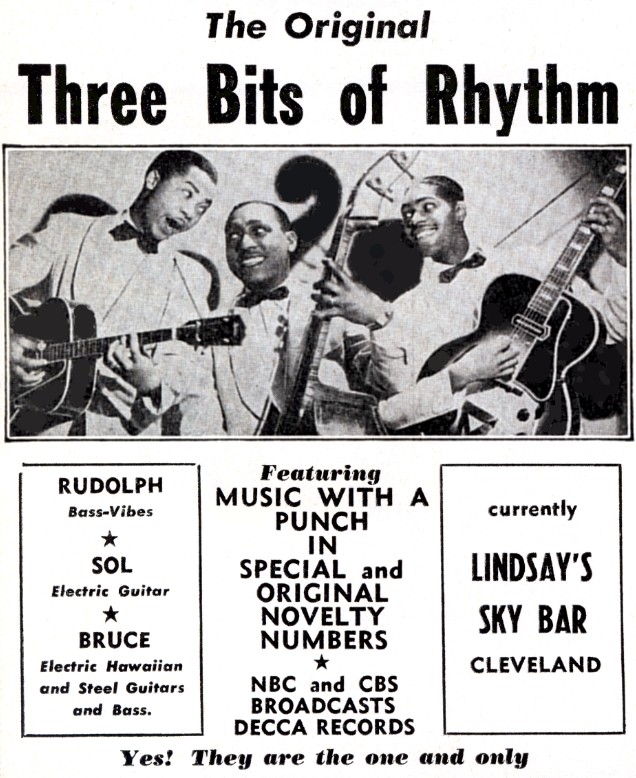
|
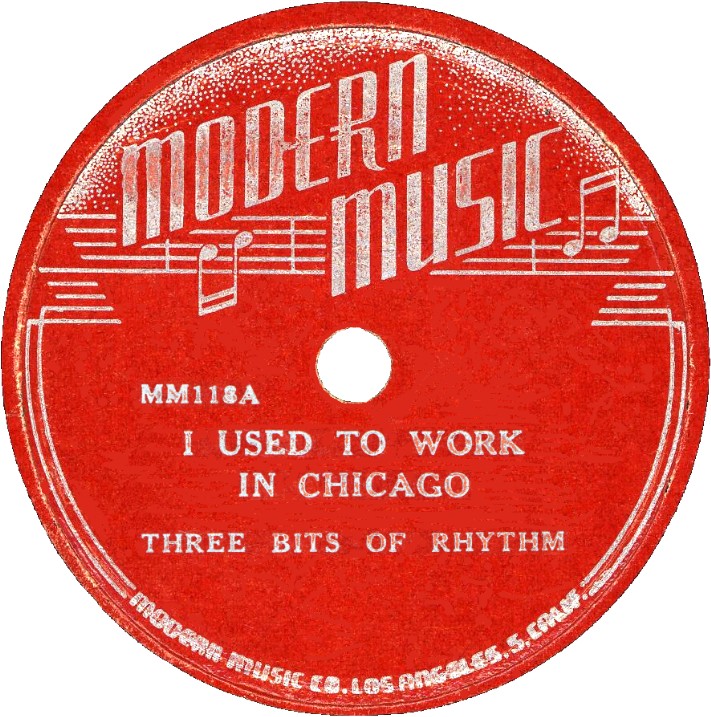
|
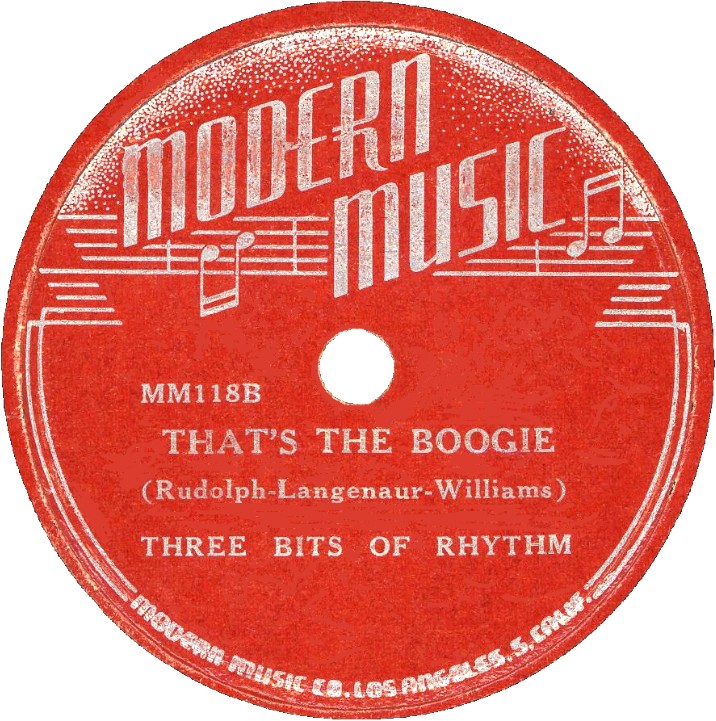
|
Above: Label images for both sides of Modern Music MM118A/B released in 1945. CASH BOX, July 29, 1946:
....Reports coming in from ops all over the land indicate that Modern Records' "I Used To Work in Chicago" is getting heavy play....The Billboard Review (6-10-46):
THREE BITS OF RHYTHM — Modern Music 118LISTEN (Windows Media Player): [Audio restoration by Dave Saviet.]
I Used To Work In Chicago/That's The Boogie
It has been some months since I last heard "I Used To Work in Chicago" and if this version doesnít hit a top spot on the jukes in the more 'down-to-earth' locations, and, at the same time, if itís not banned wherever it becomes popular, I wonít know the reason why.This is actually the best rendition of a very shady tune youíll probably hear around for awhile, since the Three Bits of Rhythm provide a stupendous amount of that quality to this disk.
On the flip, "Thatís The Boogie", the boys really prove what they can do when they get their musical instruments in action. Theyíre really good and worthy of lots of attention.
1. "I Used To Work In Chicago" - The Three Bits Of Rhythm - Modern Music MM118A - 1945.
2. "That's The Boogie" - The Three Bits Of Rhythm - Modern Music MM118B - 1945.BOTH SONGS played in sequence.
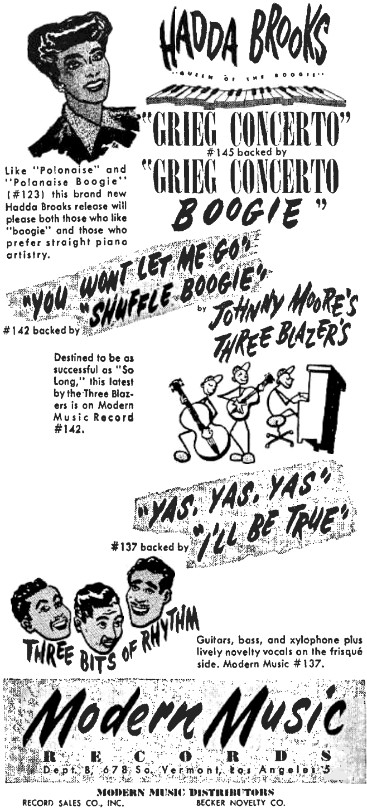
|
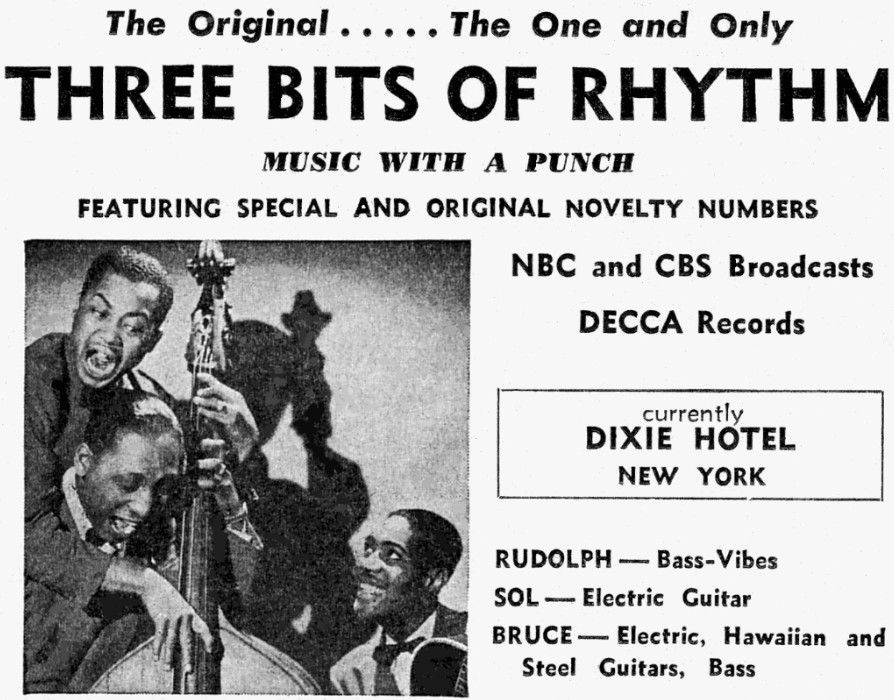
At Left: THE BILLBOARD, October 26, 1946. Above: THE BILLBOARD 1943 MUSIC YEAR BOOK.
|
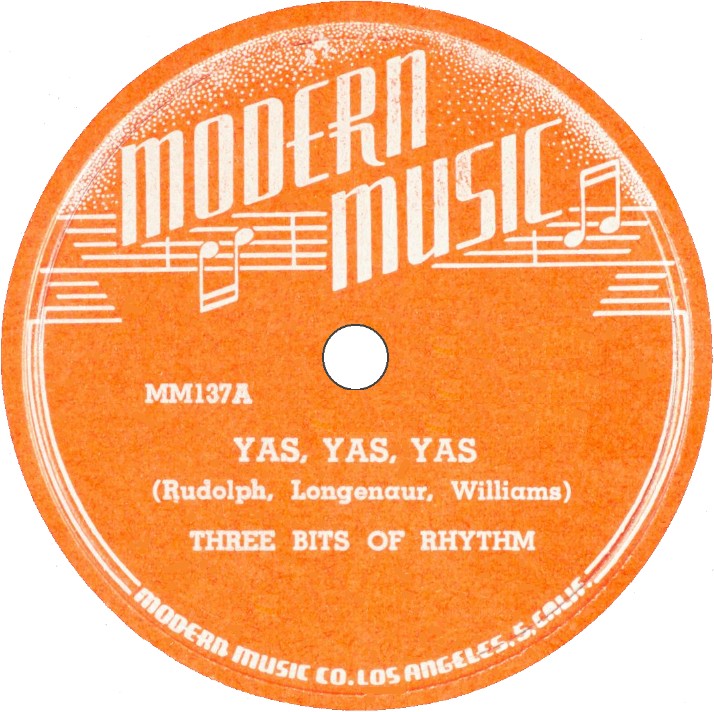
|
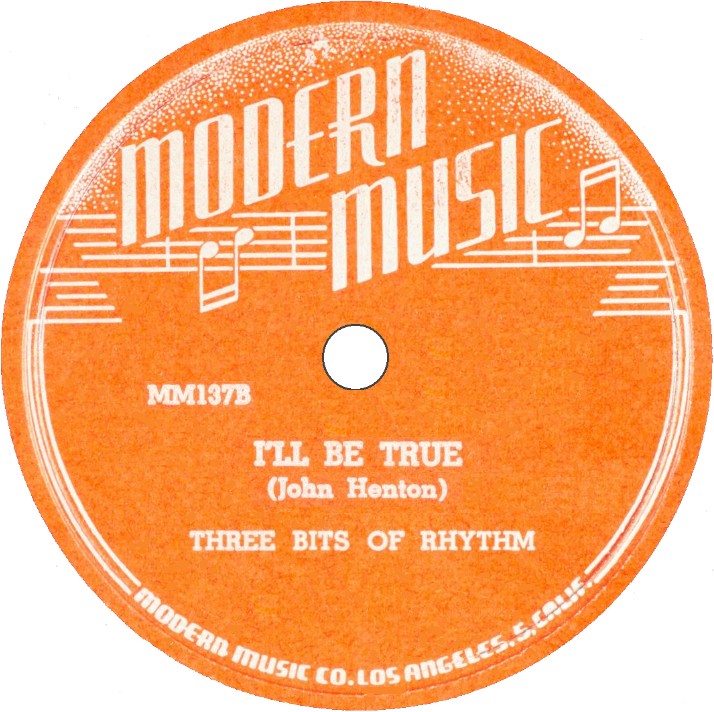
|
Above: Label images for both sides of Modern Music MM137A/B recorded on March 6, 1946 and released in 1946. This is The Three Bits Of Rhythm's second of four on Modern Music/Modern Hollywood (1946-47). They also had two releases on Decca (1941), which are included further down this page. Note that The Three Bits Of Rhythm take composer credit on the label for "Yas, Yas, Yas". The song was actually written by James (Stump) Johnson and released by him on the QRS label as "The Duck-Yas-Yas-Yas" circa 1928-1929.
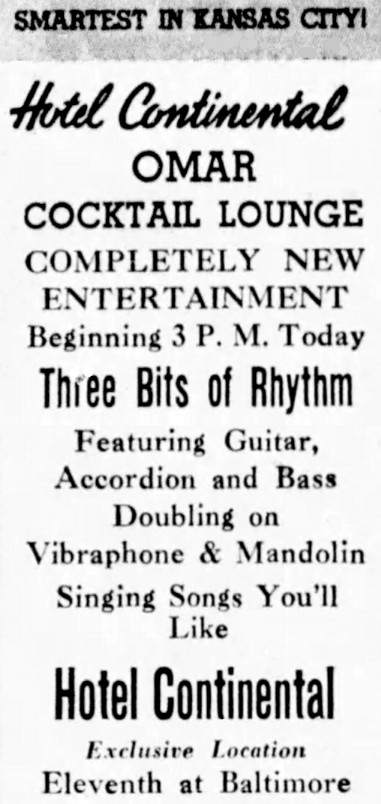
|
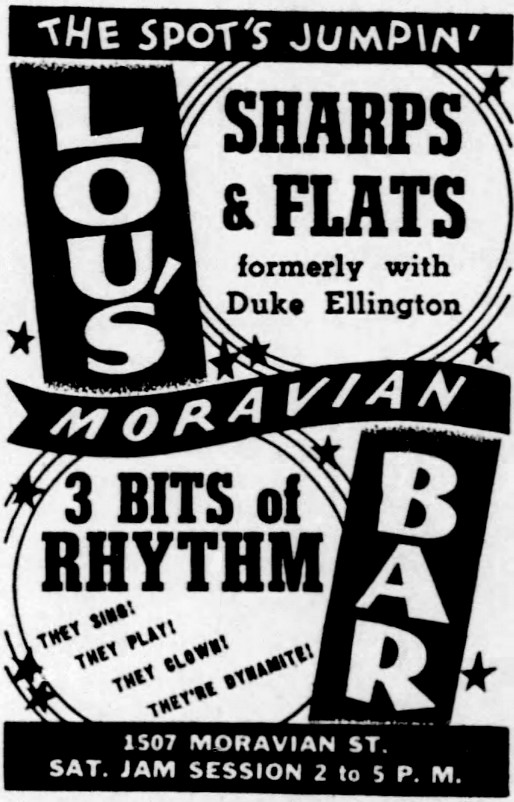
|
Above Left: KANSAS CITY TIMES, June 1, 1940. NOTE: This is possibly a different "Three Bits Of Rhythm". For example, in the Billboard 1942 Band Book, there is "Al Davis and His Three Bits of Rhythm featuring Linda, girl guitarist and vocalist.... (The group) features many doubles—two accordions, vibes, violin, guitar and bass...." If anyone has more information about this, please contact me. Above Right: PHILADELPHIA INQUIRER, February 19, 1943.
THE GAZETTE (Cedar Rapids, Iowa), May 10, 1942: THREE BITS OF RHYTHM TO OPEN AT FOXHEAD
The Three Bits Of Rhythm, a colored aggregation featuring Theodore Rudolph at the vibraharp and bass fiddle, Solomon Laugenour at the amplified guitar, and Bruce Williams at the steel guitar, amplified guitar, and bass, will open at the Foxhead Monday afternoon for a four-week engagement.
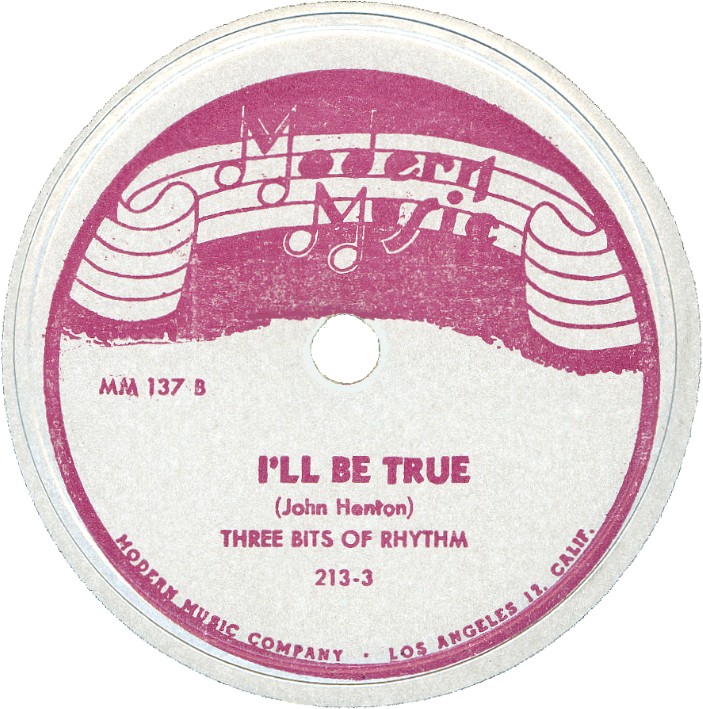
|
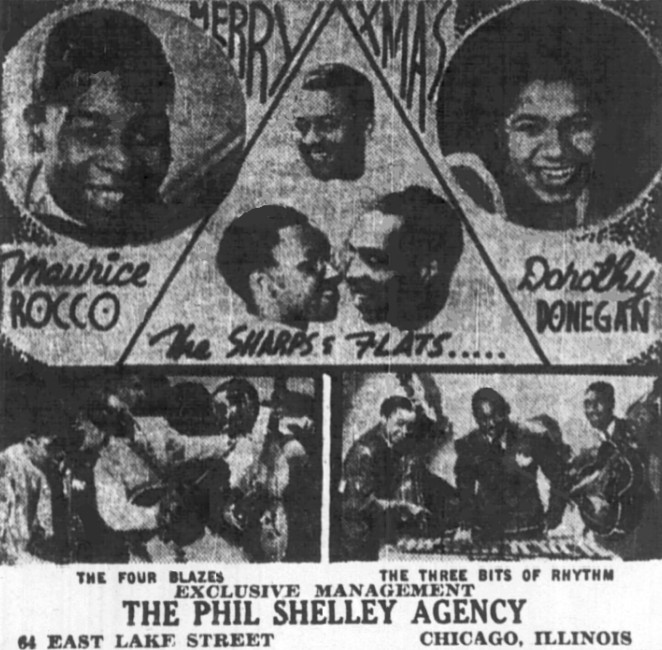
|
LISTEN (Windows Media Player): [Audio restoration by Dave Saviet.]
1. "Yas, Yas, Yas" - The Three Bits Of Rhythm - Modern Music MM137A - 1946.
2. "I'll Be True" - The Three Bits Of Rhythm - Modern Music MM137B - 1946.BOTH SONGS played in sequence.
EXTRA RECORDS — I'LL BE TRUE/YAS YAS YAS:
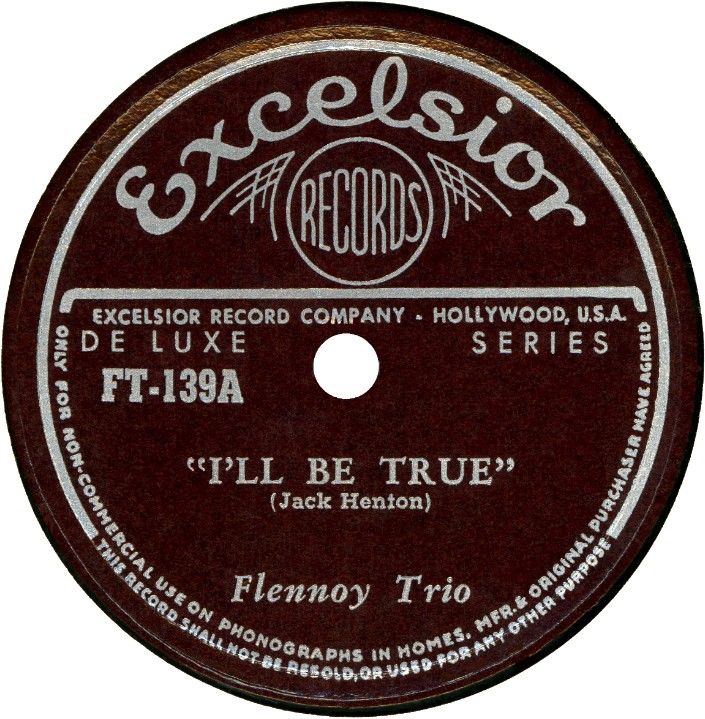
|
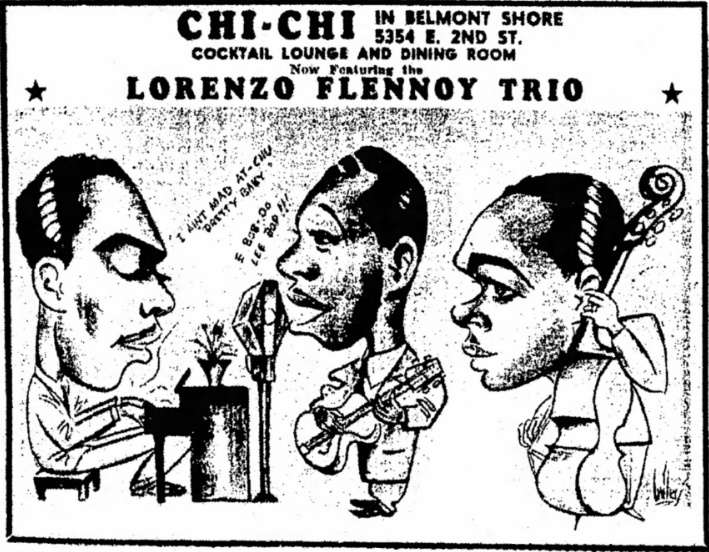
|
Above Left: Label image of Excelsior FT-139A released in 1945. "I'll Be True" was composed by John Henton and copyrighted by him in 1944. The Flennoy Trio had two records released on Melodisc (1945), one of which was backing Dan Grissom, and eight records on Excelsior (1945-49), including one side with Tina Dixon and two sides with Joe Turner.
Lorenzo Flennoy (as Lorenza Flennoy) And His Chocolate Drops performed four songs in the 1942 movie "Lady Luck". The Flennoy Trio also appeared in the movies "Mr. Ace" (1946), backing Joyce Bryant, and "I Walk Alone" (1948), the latter as The Regency Three.
Above Right: LONG BEACH INDEPENDENT (California), June 30, 1945.
NOTE: They are singing songs from two of their records, "I Ain't Mad At You Pretty Baby" and "E-Bob-O-Le-Bob-Blues", the latter with vocal by Tina Dixon.
Click HERE for an article about Lorenzo Flennoy And The Flennoy Trio by Marv Goldberg. (Will open in a separate window)
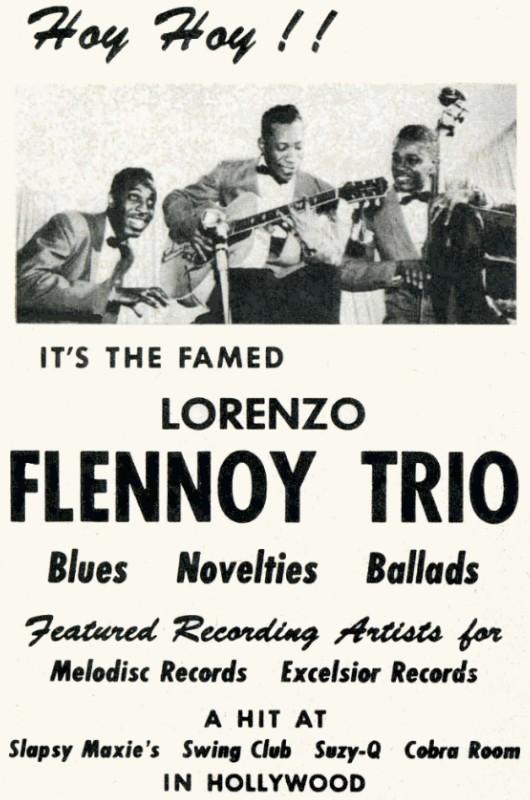
|
Above: THE BILLBOARD 1945 MUSIC YEAR BOOK. The Flennoy Trio (L-R) Lorenzo Flennoy (piano), Jimmie Edwards (guitar), and Robert Lewis (bass fiddle).
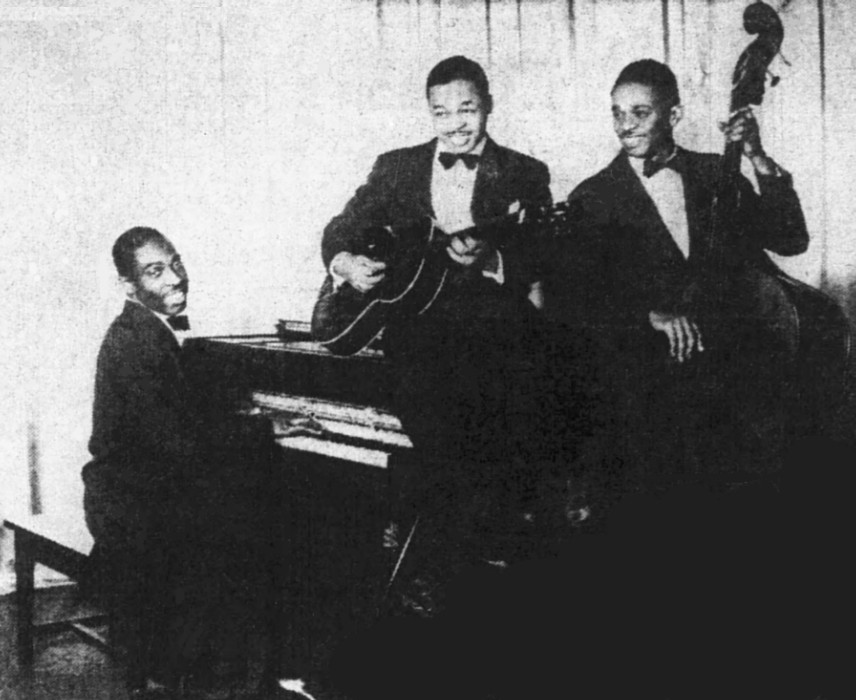
|
Above: CALIFORNIA EAGLE, December 17, 1945.
ONE OF THE FINEST small combos in the nation is the LORENZO FLENNOY TRIO. They proved that conclusively in 1945 with important engagements and impressive recordings.
(NOTE: In the photo are (L-R) Lorenzo Flennoy (piano), Gene Phillips (guitar), and Robert Lewis (bass fiddle). Phillips recorded for Modern (Music) Records from 1946 to 1950. There is a section further down on this page that features him.)LISTEN (Windows Media Player): [Audio restoration by Dave Saviet.]
"I'll Be True" - The Flennoy Trio - Excelsior FT-139A - 1945.
The Three Peppers were a vocal and instrumental trio. They had releases on Variety (1937), Decca (1939-41, 47), and Gotham (1949-51). They backed Sally Gooding on one Variety release. Vocalion reissued five of their Variety sides in late 1937. On the Variety label, they were Oliver "Toy" Wilson (piano), Bob Bell (guitar), and Walter Williams (bass fiddle).
Click HERE for an article about The Three Peppers by Marv Goldberg. (Will open in a separate window)
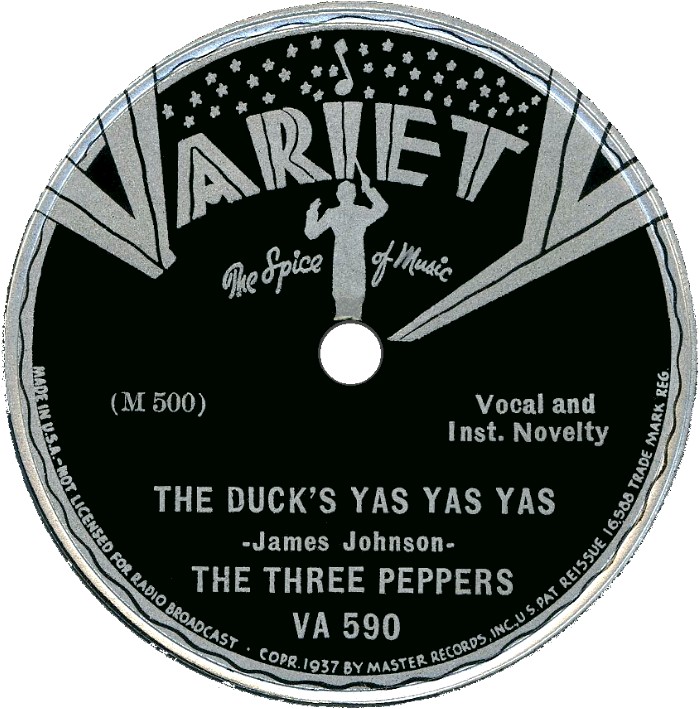
|
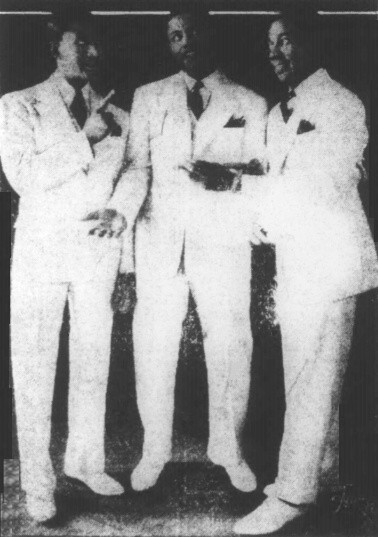
|
Above Left: Label image of Variety VA 590 recorded on May 27, 1937 and released in June 1937. This was the third of five records by The Three Peppers on Variety. It was reissued on Vocalion 3803 in October 1937. Above Right: INDIANAPOLIS RECORDER, September 12, 1936: THREE PEPPERS ARE RED HOT
The Three Peppers, who are featured nightly at the Kit Kat club in New York City, were caught giving their melodic version of "It's A Sin To Tell A Lie".Left to right: Toy Wilson, piano; Robert Bell, guitar; and Walter Williams, bass fiddle. Robert Bell, formerly of St. Louis, at one time was a member of the Fate Marble-Charlie Creath orchestra.
LISTEN (Windows Media Player): [Audio restoration by Dave Saviet.]
"The Duck's Yas Yas Yas" - The Three Peppers - Variety VA 590 - 1937.
EXTRA RECORDS — THE THREE BITS OF RHYTHM:
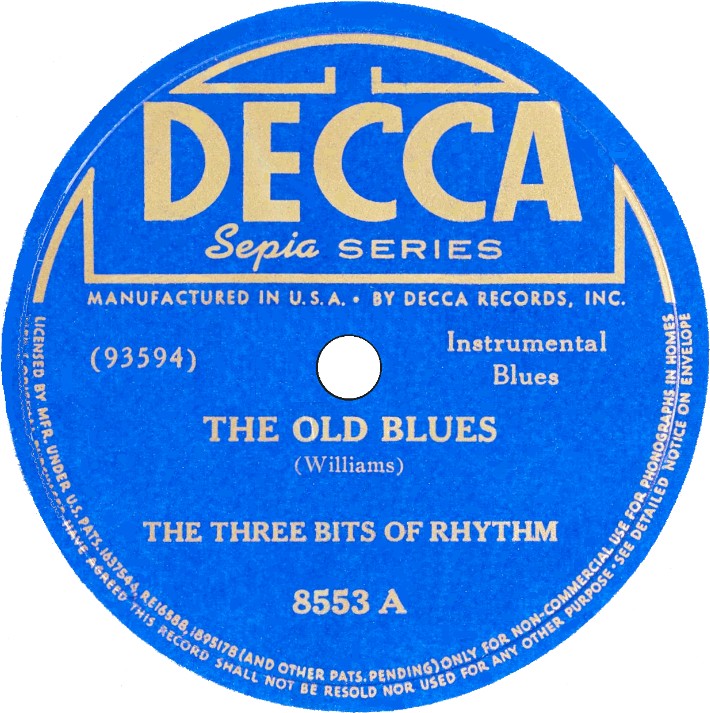
|
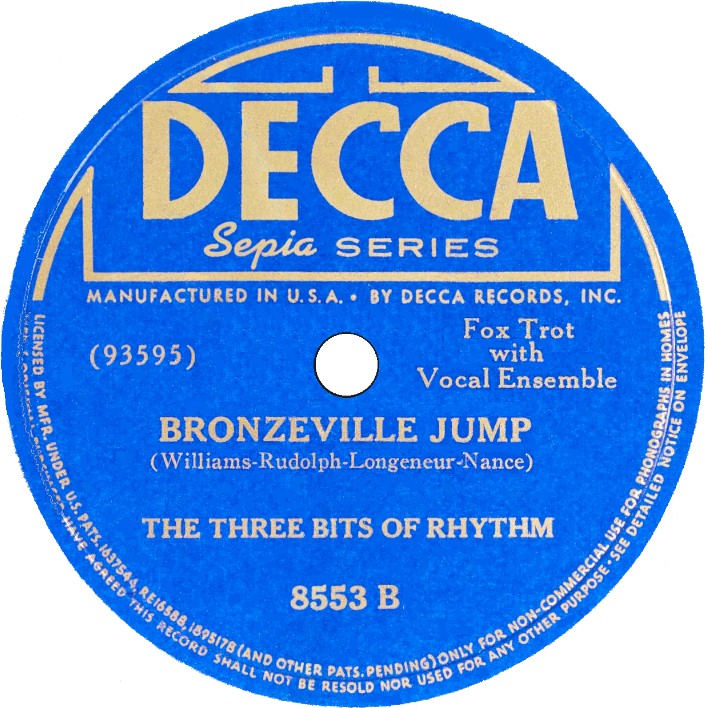
|
Above: Label images for both sides of Decca 8553 A/B recorded on March 13, 1941 and released in 1941. "The Old Blues" is an instrumental. Decca's "Sepia" 8000 series existed from 1940 to 1945. There was also an overlapping "Race" 7000 series from 1934 to 1942. And, later on, the "R&B" 48000 series starting in 1946 and extending into the 1950's.
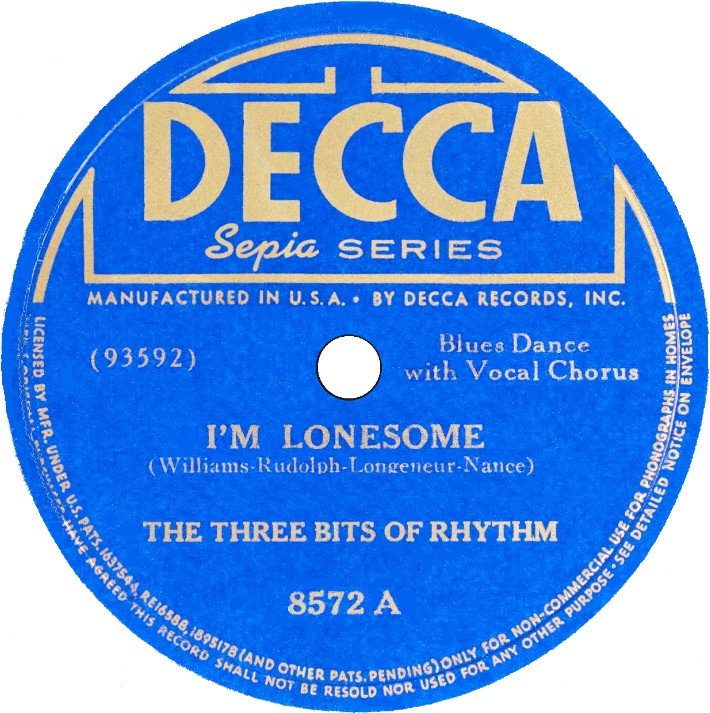
|
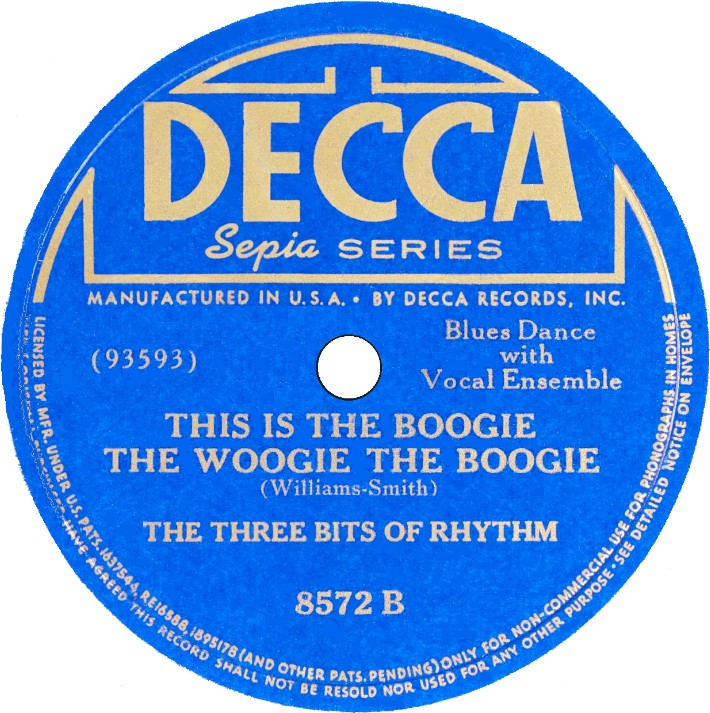
|
Above: Label images for both sides of Decca 8572 A/B recorded on March 13, 1941 and released in 1941. The two Decca records shown above are The Three Bits Of Rhythm' only releases on the label. All four sides were recorded in the same 3/13/41 session, On the above "B" side, they sing "This is the boogie, the boogie, the woogie" and "This is the boogie, the woogie, the woogie", but never the actual title of the song as shown on the label.
The Decca "This Is The Boogie...", while similar, is a different song than their earlier "That's The Boogie" on Modern Music.
The composer "Williams" shown on all four of the above labels is probably J. Mayo Williams. He was head of the "race records" department at Decca Records at the time. Williams and The Three Bits Of Rhythm were both located in Chicago.
LISTEN (Windows Media Player): [Audio restoration by Dave Saviet.]
1. "The Old Blues (Instrumental)" - The Three Bits Of Rhythm - Decca 8553 A - 1941.
2. "Bronzeville Jump" - The Three Bits Of Rhythm - Decca 8553 B - 1941.
3. "I'm Lonesome" - The Three Bits Of Rhythm - Decca 8572 A - 1941.
4. "This Is The Boogie The Woogie The Boogie" - The Three Bits Of Rhythm - Decca 8553 B - 1941.ALL FOUR SONGS played in sequence.
GENE PHILLIPS: Gene Phillips, from St. Louis, was a singer, guitarist, composer, and band leader. His Rhythm Aces band, on the Modern label, at various times included Jake Porter, Maxwell Davis, and Jack McVea, among other noted musicians.
Between 1946 and 1950, Gene had at least a dozen records released on the Modern (Music) label. Some of the songs encompassed a "big woman" theme, such as "Big Fat Mama", "Big Legs", and "Fatso" (all three included below).
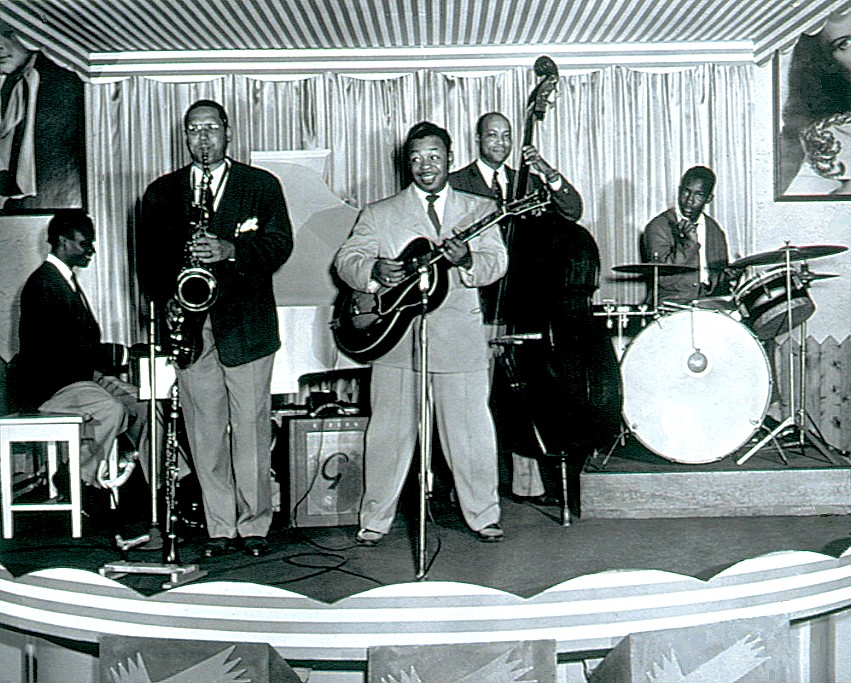
|
Above: Photo of Gene Phillips And His Rhythm Aces. Gene is in center playing the guitar.
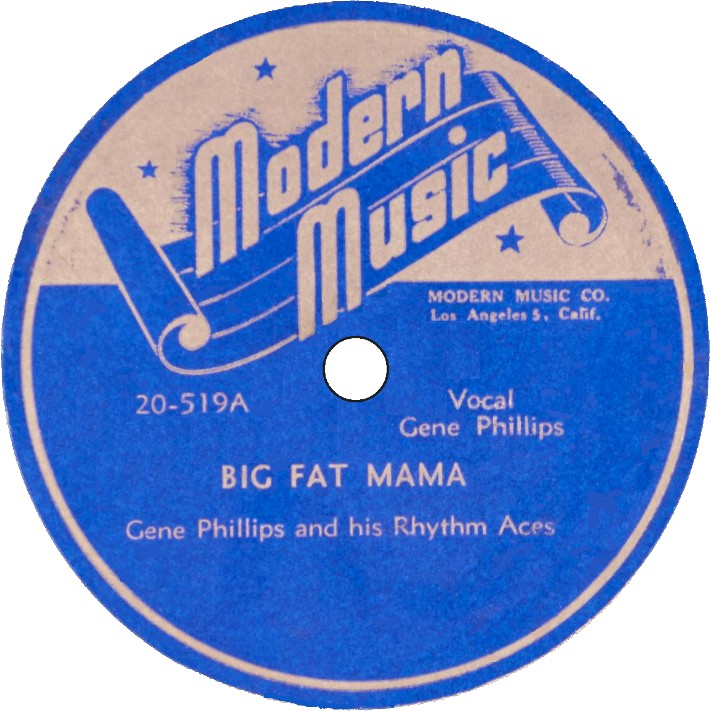
|
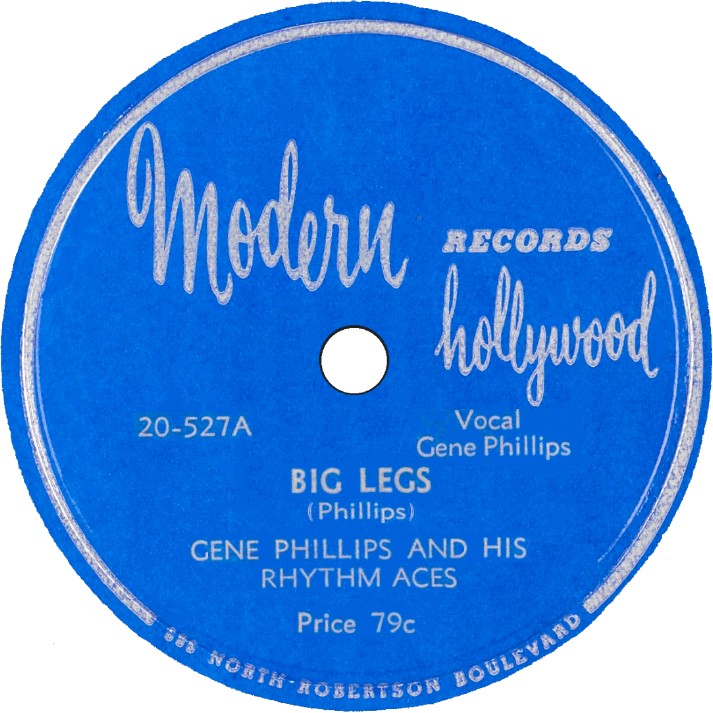
|
Above Left: Label image for Modern 20-519A, released in 1947. The band provides Gene with vocal backing on "Big Fat Mama". Notice the label for "Big Fat Mama" has no composer credits. The song was written by Lucky Millinder-Stafford Simon and released by Millinder on Decca 4041 in 1942. After Gene Phillips' version came out in May 1947, Millinder's original was re-issued on Decca 48053 in November 1947.
Roy Milton also released the song on Specialty SP 518 in September 1947, also with no composer credits [This record is featured in the "Specialty Records - Part Two" article].
Above Right: Label image for Modern 20-527A, released in 1947. "Modern Music" changed their name to "Modern Records" in late 1947. And with it came a new label design that remained unchanged afterward, in either blue or red.
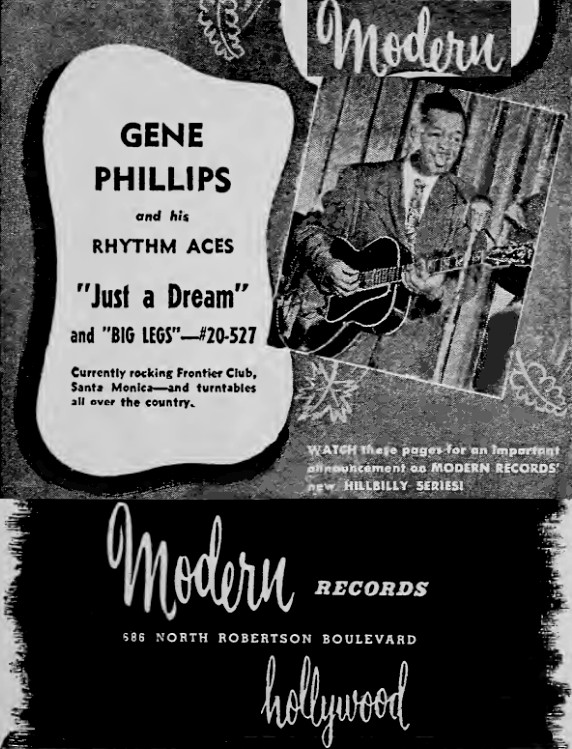
|
Cash Box Review (8-25-47):
GENE PHILLIPS — MODERN 20-519 Big Fat Mama
Here's Gene Phillips—plenty brown and lowdown. While Gene wails for a "Big Fat Mama" youíll hear many a coin pop into jukes in race spots all over the land. Fast tempo, plus good melody, to make up a very nice hunk of wax. Itís this side that has the big play possibilities.The Billboard Review (8-9-47):
GENE PHILLIPS — MODERN 20-527 Big Legs
With a small jazz group pouring on the rhythmic contagion, Gene Phillips shouts the lyrics in a righteous fashion for this race side. The side carries a conventional blues item chanted in typical race fashion.Cash Box Review (9-1-47):
GENE PHILLIPS — MODERN 20-527 Big Legs
Gene Phillips goes to town with a grand hunk of race wax on the topside, "Big Legs", opening with a wailing chant and then showing off with some hot instrumental licks by his Rhythym Aces while he wails out the vocal to the gal with the big legs. Hereís a disk thatís surefire in any race spot.LISTEN (Windows Media Player): [Audio restoration by Dave Saviet.]
1. "Big Fat Mama" - Gene Phillips And His Rhythm Aces (Vocal Backing By The Band) - Modern 20-519A - 1947.
2. "Big Legs" - Gene Phillips And His Rhythm Aces - Modern 20-527A - 1947.BOTH SONGS played in sequence.
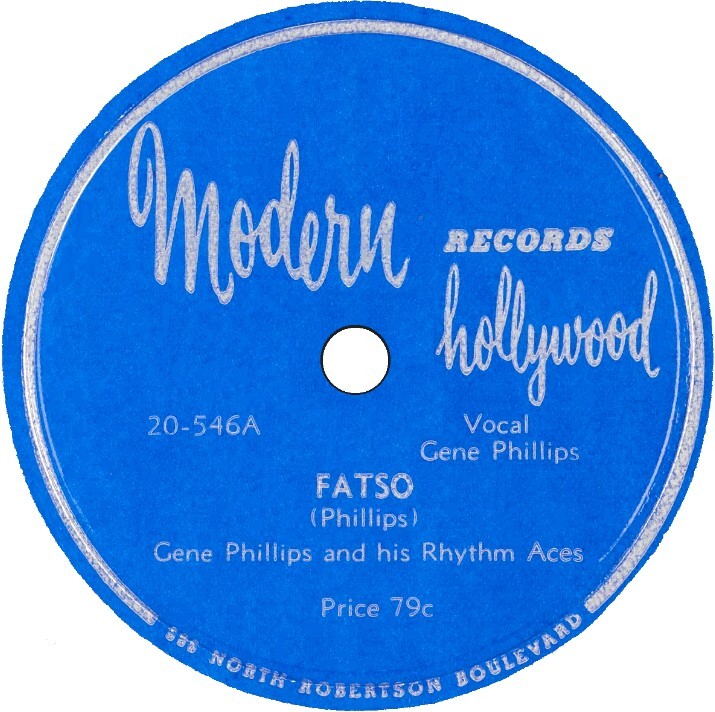
|
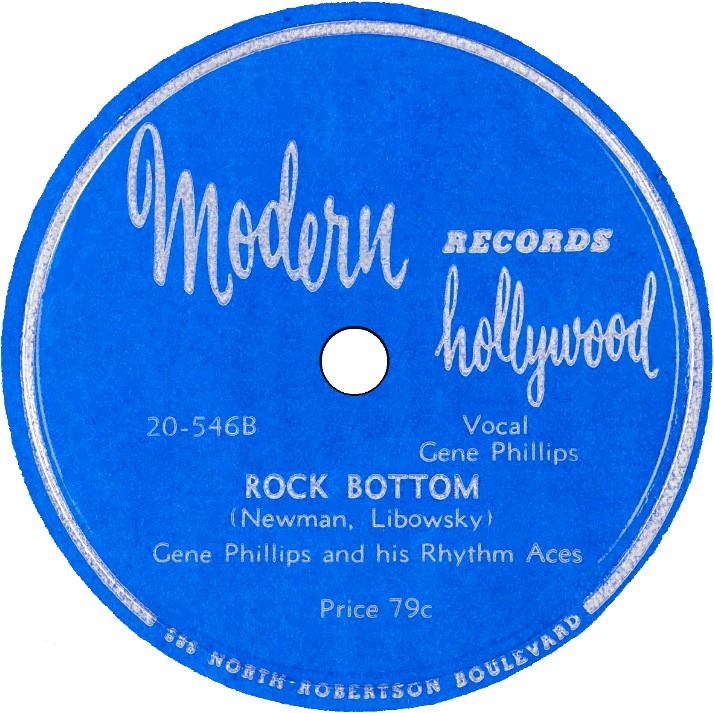
|
Above: Label images for both sides of Modern 20-546A/B, released in 1947. Gene gets vocal backing from the band on both sides.
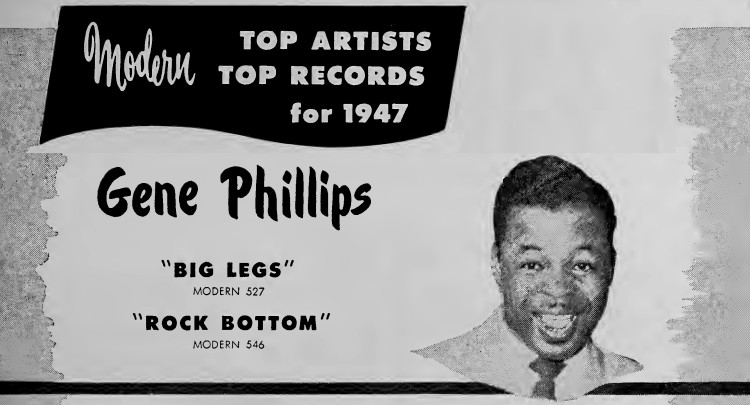
|
Cash Box Review (10-27-47):
GENE PHILLIPS — MODERN 20-527 Rock Bottom/Fatso
Pair of sides by comer Gene Phillips, currently riding high on the boxes with his version of "Big Legs", comes a calling to rate like a spade flush. Youíll go for Gene as he beats it out to "Rock Bottom", side with a heavy mood set way down low. Mood is mellow all thru with the warbling coming thru in fine manner.On the flip, with more stuff aimed at your race spots, Gene offers the cute wordage to "Fatso". Side continues the merriment set on the top deck and should meet with wide approval on the part of a host of phono ops.
That Gene is well loaded down with heavy possibilities is established on this pairing. Get next to the guy—but pronto.
CALIFORNIA EAGLE, November 11, 1948.
....Gene Phillips plays music for a hobby. The famous blues-singer-guitarist is now a radio technician. Remember what I said a few columns back: Musicians gotta eat too, ya' know....
(NOTE: Not sure what this columnist was driving at. Gene did record at least three records on Modern after the date of this blurb.)LISTEN (Windows Media Player): [Audio restoration by Dave Saviet.]
1. "Fatso" - Gene Phillips And His Rhythm Aces (Vocal Backing By The Band) - Modern 20-546A - 1947.
2. "Rock Bottom" - Gene Phillips And His Rhythm Aces (Vocal Backing By The Band) - Modern 20-546B - 1947.BOTH SONGS played in sequence.
LITTLE WILLIE JACKSON: Little Willie Jackson, who was blind, was a singer, saxophonist, composer, and band leader. He and pianist Joe Liggins were in a band together in the San Diego area in the 1930s. They both moved to Los Angeles in the late 1930s. Together, in the mid-1940s, they formed the Joe Liggins And His Honeydrippers band.
In 1947, Modern Records was able to get The Honeydrippers, minus Joe Liggins, to record for them. It was on these recordings that Little Willie Jackson performed as bandleader, singer, and saxophonist. This resulted in at least seven records released on the Modern label in 1947-1948, and another in 1951. "58th Street Jump"/"On The Sunny Side Of The Street" is the first of these.
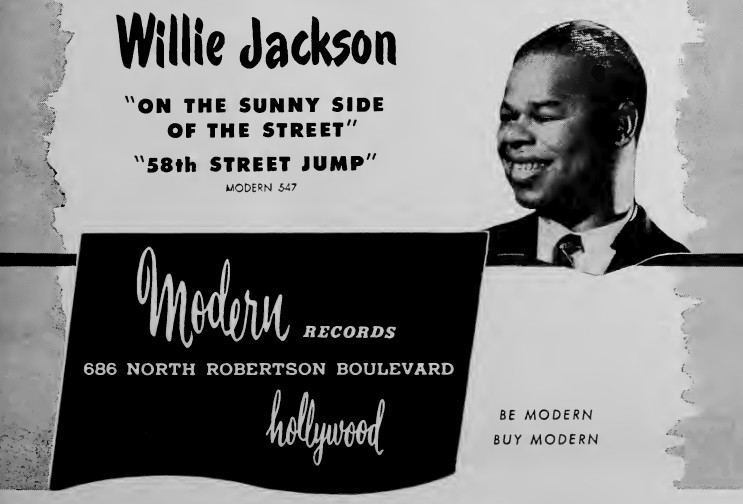
|
Above: CASH BOX, November 29, 1947. "Be Modern Buy Modern".
NOTE: This ad has the "B" side of the record displayed on top.
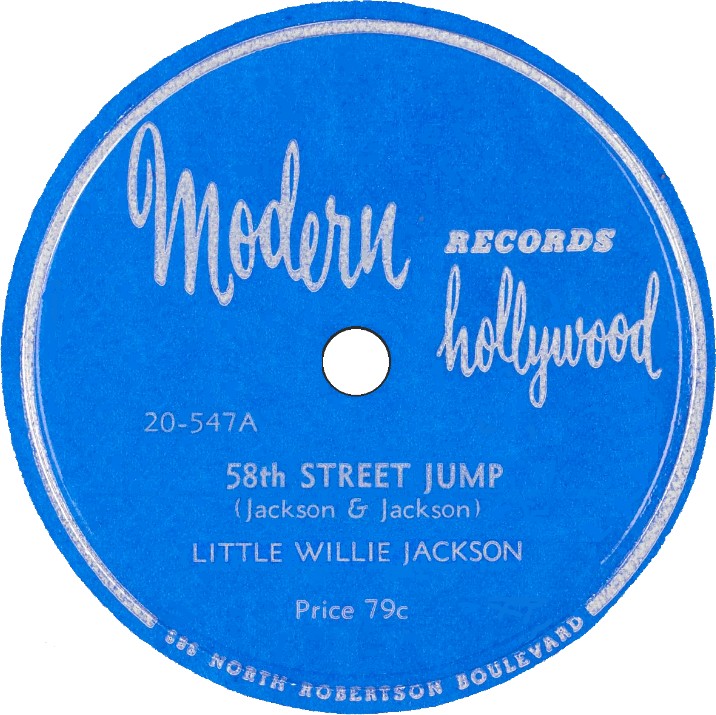
|
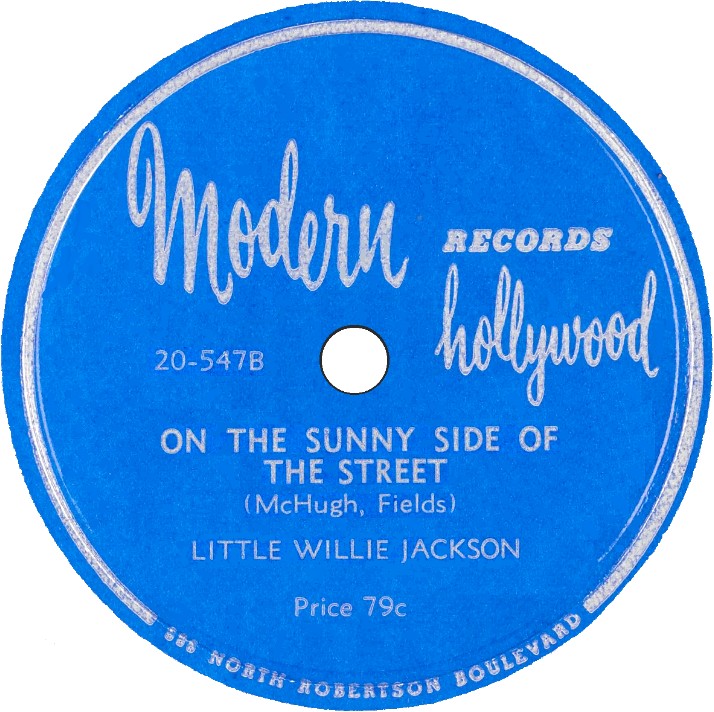
|
Above: Label images for both sides of Modern 20-547A/B, released in late 1947. "58th Street Jump" is an instrumental, the flip-side has singing. The "58th Street Jump" label shows composers as "Jackson & Jackson". Other Modern Record labels of Jackson's songs credit "Jackson-Jackson". Just who might this second "Jackson" be?
The BMI website shows "58th Street Jump"'s composers are William Jackson and Joe Bihari. Also, BMI, for another "Jackson-Jackson" composed song, shows William Jackson and Joe Josea. Draw your own conclusion. The publishing company is "Modern Music Publishing Company" in both cases.
At Right: Photo of (Left) Joe Liggins, piano; and (Right) Little Willie Jackson, saxophone.
CASH BOX, October 27, 1947: MODERN PACTS JACKSON
HOLLYWOOD—Modern Records, this city, announced the signing of Little Willie Jackson, to a term recording contract this past week. Jackson, formerly featured sax man with the Joe Ligginsí band will continue to record as a sideman for Liggins, but will use a combo of his own on the Modern label.His first recording, scheduled for early release is to be "On The Sunny Side Of The Street" and "58th Street Jump". The signing of Jackson is in accordance with the new policy of Modern in their wide entrance as a prominent independent in the recording field.
(NOTE: Again above, the "B" side of the record gets top billing.)
CASH BOX, November 15, 1947:
....Prexy Jules Bihari of Modern Records has been waxing Gene Phillips and Willie Jackson in all day sessions....really stocking up a fine library....CASH BOX, March 6, 1948:
....Florette Bihari, the familyís and firmís obliging publicity gal, tells us March 5 releases will include a new Willie Jackson number and a pair of sides by Gene Phillips....LISTEN (Windows Media Player): [Audio restoration by Dave Saviet.]
1. "58th Street Jump (Instrumental)" - Little Willie Jackson - Modern 20-547A - 1947.
2. "On The Sunny Side Of The Street" - Little Willie Jackson - Modern 20-547B - 1947.BOTH SONGS played in sequence.
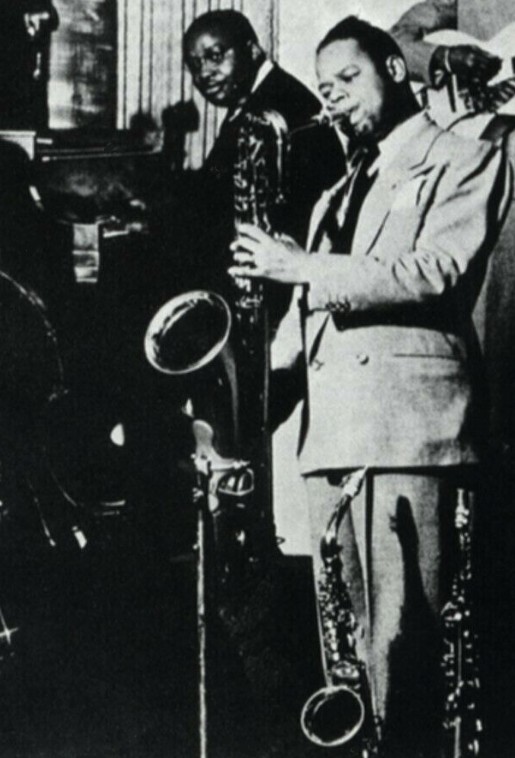
THE COMMANDERS: Almost nothing is known about The Commanders. Their one record on Modern in 1948 is their only known record. That was perhaps because of a way too harsh review of the record by The Billboard. The Billboard reviewer thought the group was a "take-off on The Ink Spots". Really! Or maybe it was the long time (four months) between the recording and the release of the record.
Actually, The Commanders are in the style of The Ravens on "Lonesome Road" and in their own style on "I'd Like To Know You Better Than I Do".
Cash Box's review, on the other hand, had only good things to say.... "first rate", "shine brilliantly", "command attention", "a cinch to clinch"....
If anyone has a photo of them and/or can provide information about them, please contact me.
At Right: THE BILLBOARD, February 28, 1948. No mention is made of the flip-side. Apparently, the sales push was for "Lonesome Road", even though the other side might be the "better" one (literally and figuratively).
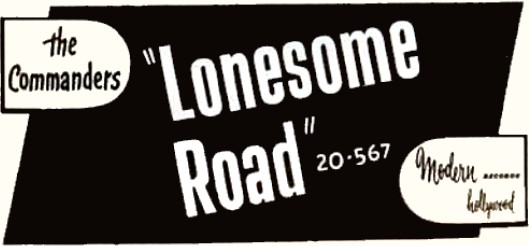
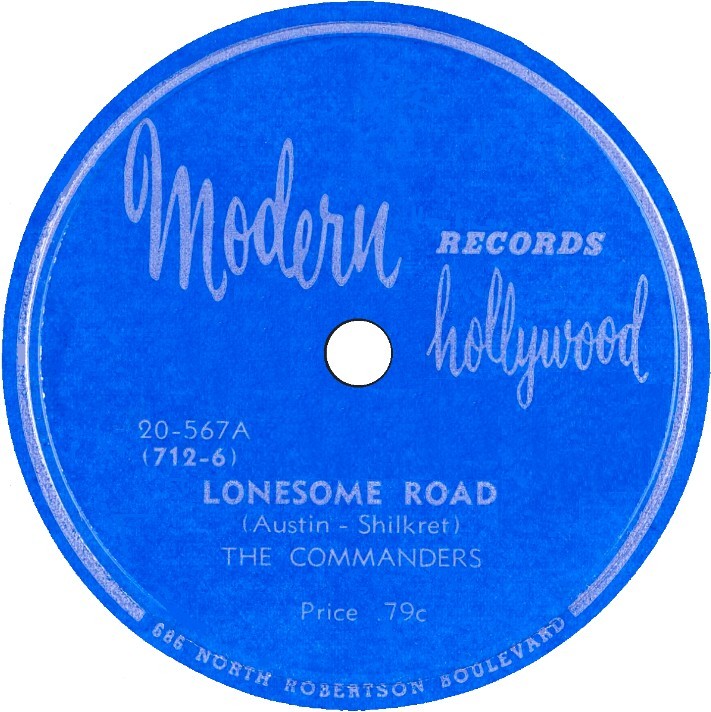
|
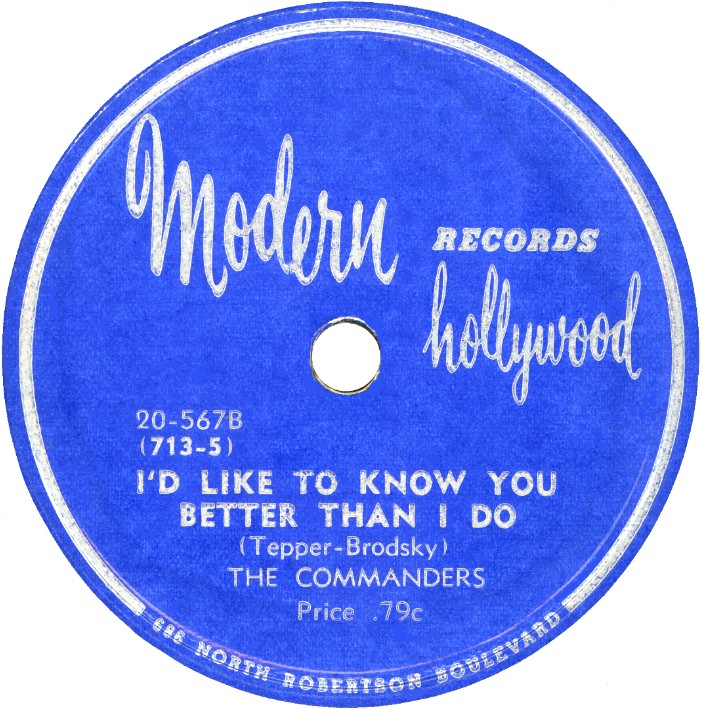
|
Above: Label images for both sides of Modern 20-567A/B, recorded on November 8, 1947 and released in February 1948. This 78-rpm record is made of vinyl, not the shellac usually used. "B" SIDE: Sid Tepper and Roy Brodsky (aka Roy C. Bennett) composed many songs for Elvis Presley in the late 1950s and throughout the 1960s.
CASH BOX, March 20, 1948:
....Saul Bihari, Modern Records vee pee observed rubbing his hands as the Commanders version of "Lonesome Road" starts to boom. Canít tell the difference between them and The Ravens....Cash Box Review (3-6-48):
THE COMMANDERS — MODERN 20-567 I'd Like To Know You Better Than I Do/Lonesome Road
Itís the gravy train with this combo. First release by this new vocal combo tagged The Commanders shows as must material for the machines.Wailing in first rate harmonious tones that shine brilliantly, the group step out to offer "Iíd Like To Know You Better Than I Do" and "Lonesome Road", a pair of sides that should set right with music ops throughout the nation.
Top deck spills in slow fashioned rhythm, with the sugar coated wordage echoing sweetly all the way. Deep bass spot highlights the platter, while the instrumental work behind the crew shows effectively.
On the flip with the standard "Lonesome Road", the Commanders really command attention. Itís the bass vocal that glows again with the silver lyrics getting a grand rendition.
Donít miss this pair theyíre a cinch to clinch.
LISTEN (Windows Media Player): [Audio restoration by Dave Saviet.]
1. "Lonesome Road" - The Commanders - Modern 20-567A - 1948.
2. "I'd Like To Know You Better Than I Do" - The Commanders - Modern 20-567B - 1948.BOTH SONGS played in sequence.
EXTRA RECORDS — LONESOME ROAD: "Lonesome Road" is a 1927 song with music by Nathaniel Shilkret and lyrics by Gene Austin. It was first recorded in 1927 by Austin backed by the Victor Orchestra (led by Shilkret).
It has been performed by many artists over the years. Some of the artists, other than The Commanders, that had records of the song released in the 1940s are Lonnie Johnson on Bluebird in 1944, Valaida Snow And The Day Dreamers on Bel-Tone in 1946, Paul Breckenridge And The Four Heavenly Knights on King in 1947, Jimmy "Baby-Face" Lewis on Aladdin in 1947, Jimmy Lunceford on Columbia in 1948, Sticks McGhee on Atlantic in 1949, and The Four Tunes on RCA Victor in 1949.
The Valaida Snow and Paul Breckenridge versions are featured here.
Valaida Snow, born in Chattanooga, Tennessee, was known as "Queen of the Trumpet". She was a charismatic singer, trumpet player, dancer, and overall entertainer extraordinaire. Valaida became known as "Little Louie" after Louis Armstrong called her the world's second best jazz trumpet player besides himself.Instrumentally, she was multi-talented, learning to play cello, bass, banjo, violin, mandolin, harp, accordion, clarinet, trumpet, and saxophone at professional levels by the time she was 15.
WATCH VIDEO of Valaida Snow And The Ali Baba Trio perform "Patience And Fortitude" from a 1946 Soundie in MP4 format. (Will open in a new window)
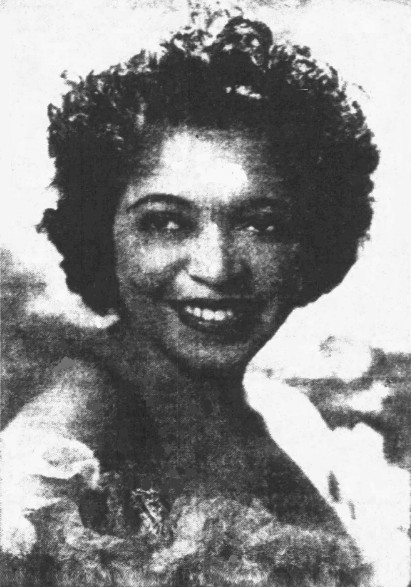
|
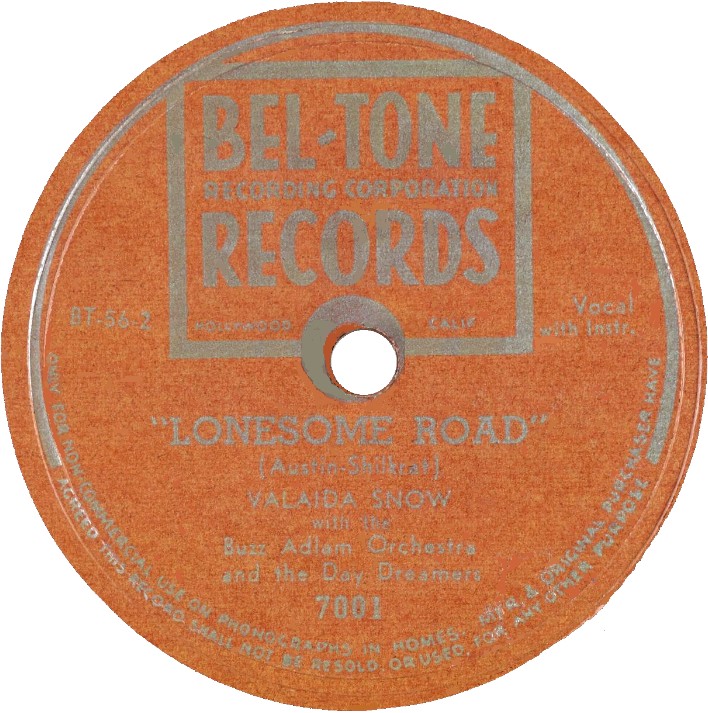
|
Above Left: CALIFORNIA EAGLE, November 28, 1946: DRAWS RAVES FROM CRITICS
Valaida Snow, golden-voiced singer of torch songs, drew plenty of raves from theatrical critics for her authentic interpretation of Hebrew folk songs at Grossinger's Country Club at Ferndale, New York, last week.Above Right: Label image of Bel-Tone 7001 released in February 1946. Valaida had four records on the Bel-Tone label (Feb-July 1946). On this record, she is backed vocally by The Day Dreamers. There was a "Day Dreamers" vocal group that backed up Ella Fitzgerald on Decca in 1947. Not sure if this is them.
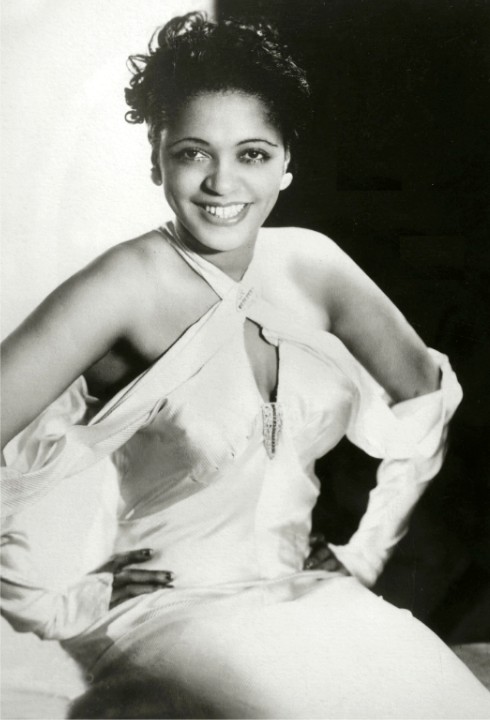
|
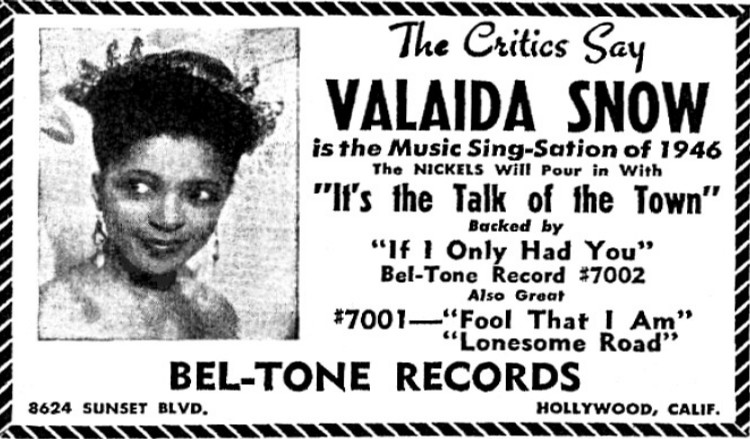
Bel-Tone released in the popular, rhythm and blues, and folk fields. Artists included Freddy Stewart, Valaida Snow, Cliffe Stonehead, Monte Hale, and Buzz Adlam. The company declared bankruptcy in November 1946.
|
LISTEN (Windows Media Player): [Audio restoration by Dave Saviet.]
"Lonesome Road" - Valaida Snow And The Day Dreammers - Bel-Tone 7001 - 1946.
Paul Breckenridge, nick-named the "Harlem Hurricane," was actually from Cleveland. In 1946, Lucky Millinder "discovered" Paul as a "new singing sensation", becoming one of Lucky's featured singers on stage and records.
In 1948, Lucky, with Paul, had a regular Wednesday night radio show, "Swingtime At The Savoy", on the NBC coast-to-coast network. They were also appearing at the Apollo Theatre and the "famed" 845 Club, both in New York City.
Paul could hit the high notes on his spiritual songs, with "Rock-A-Ma-Soul" and "I Shall Not Be Moved" as great examples. Both of these sides were released on the King label in 1947.
LISTEN (Windows Media Player): [Audio restoration by Dave Saviet.]
1. "Rock-A-Ma-Soul" - Paul Breckenridge And The Four Heavenly Knights - King 4182-A - 1947.
2. "I Shall Not Be Moved" - Paul Breckenridge And His Four Heavenly Knights - King 4192-A - 1947.BOTH SONGS played in sequence.
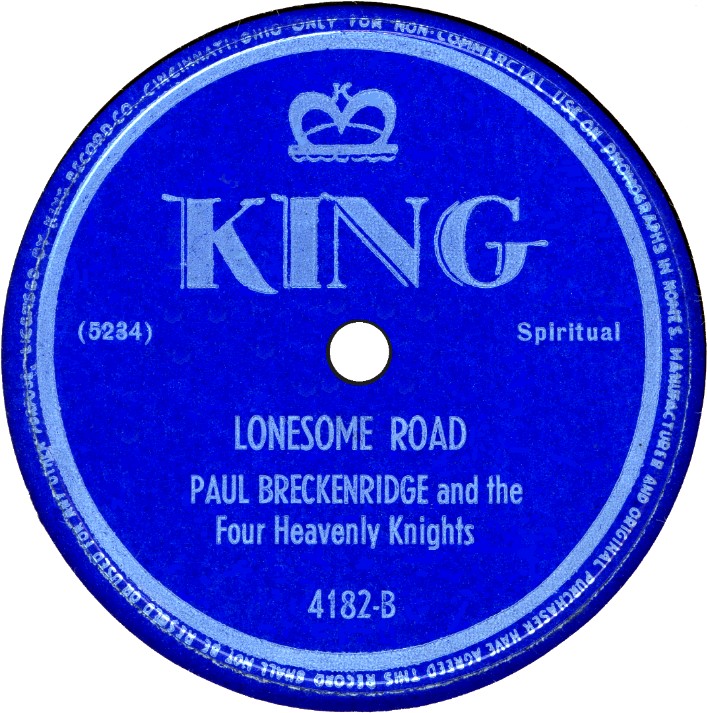
|
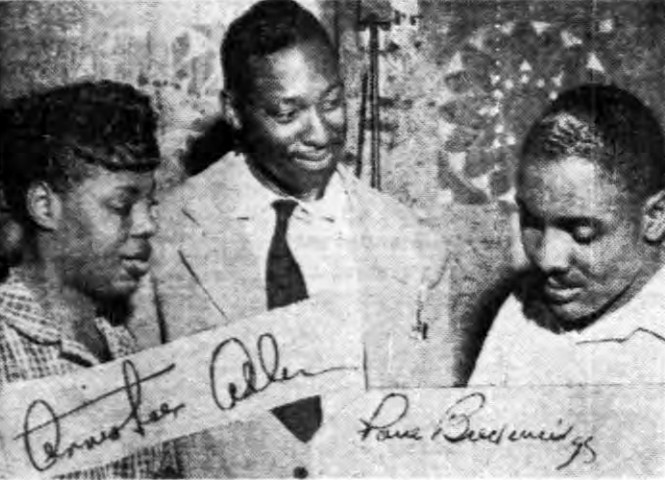
|
Above Left: Label image of King 4182-B released in 1947. No composer credit on the label. It seems that independent record companies, including Modern Music, did this a lot and got away with it. Above Right: CALIFORNIA EAGLE, November 12, 1949:
Paul Breckenridge [at far right] and Annisteen Allen of Lucky Millinder band offer samples of their handwriting for analysis to Gordon Anderson (who could determine a person's traits from their handwriting)....
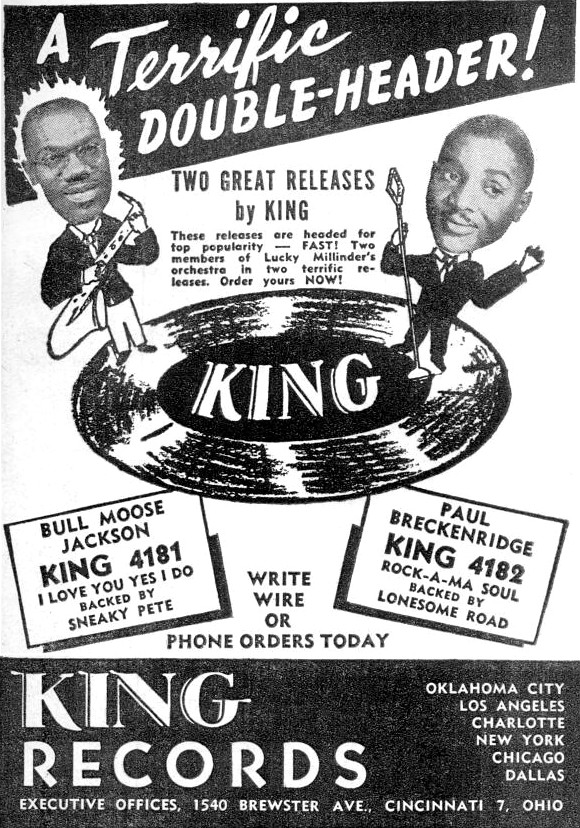
|
Above: THE BILLBOARD, November 1, 1947.
NOTE: Lucky Millinder had a great sense of talent. His featured vocalists over the years included Trevor Bacon, Sister Rosetta Tharpe, Annisteen Allen, Paul Breckenridge, Bus Brown, Judy Carol, Melvin Moore, Wynonie Harris, Big John Greer, John Carroll, Bull Moose Jackson, and Sarah McLawler.Also, in a rare misjudgement, Ruth Brown, prior to her Atlantic days, made one appearance before he rudely fired her.
The Billboard Review (12-13-47):
PAUL BRECKENRIDGE (Four Heavenly Knights) — KING 4182
Lonesome Road (76) Good treatment with Breckenridge in fine voice.
(NOTE: Ratings had a range of 0-100 with 70-79 considered as "good".)LISTEN (Windows Media Player): [Audio restoration by Dave Saviet.]
"Lonesome Road" - Paul Breckenridge And The Four Heavenly Knights - King 4182-B - 1947.
THE SCAMPS: The Scamps were a vocal/instrumental group from Kansas City. They had five records on the Modern Music and Modern labels (1947-1948) and, as by The Five Scamps, they had another five records on the Columbia label (1949). There was also a single release by The Scamps on Peacock (1955).
THE BILLBOARD, April 19, 1947:
....The Scamps, Kansas City Negro harmony group, have been inked by the Modern Music label....CASH BOX, April 21, 1947: MODERN RECORDS PACT NEW COMBO
HOLLYWOOD—Inking of the Scamps, Kansas City combo, to an exclusive recording contract for Modern Records was announced late this week, by Jules Bihari, platter executive. Earlier reports had listed The Scamps as signed by one of the major companies.First releases by this new combo include "Donít Cry Baby", "More Than You Know", "I Wonder, I Wonder, I Wonder", and "Thatís My Desire". "First releases are to be expected late this mohth", Bihari stated.
(NOTE: In actuality, their first release was in January 1947, followed by their second in March.)
THE BILLBOARD, March 12, 1949:
....The Five Scamps, Kansas City, Mo., Negro harmony and instrumental combo.... were inked by Columbia and cut their first session last week....
Click HERE for an article about The Scamps by Marv Goldberg. (Will open in a separate window)
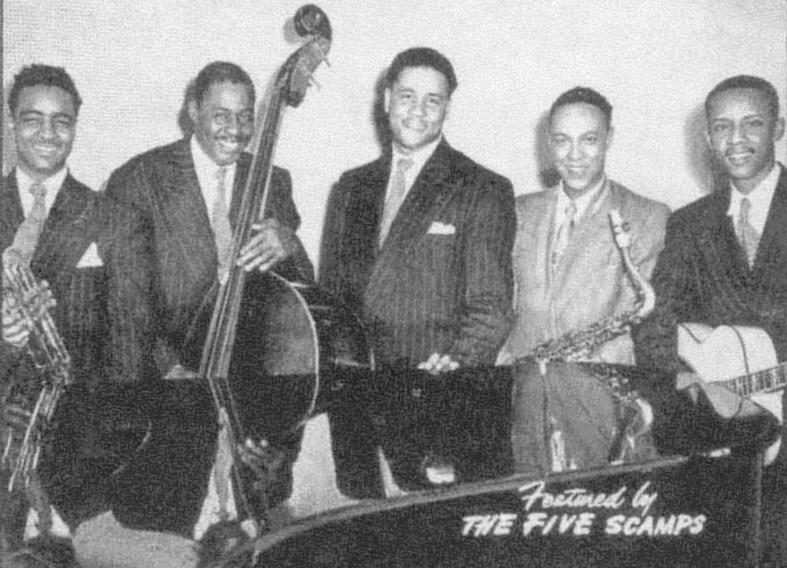
|
Above: Photo of The Five Scamps from 1949. Shown are: (L-R) Edward Stafford, James Whitcomb, Earl Robinson, Rudy Massingale, and Wyatt Griffin. They are all holding their musical instruments, with Earl's hand on the piano. Rudy is the only one that is "out of uniform".
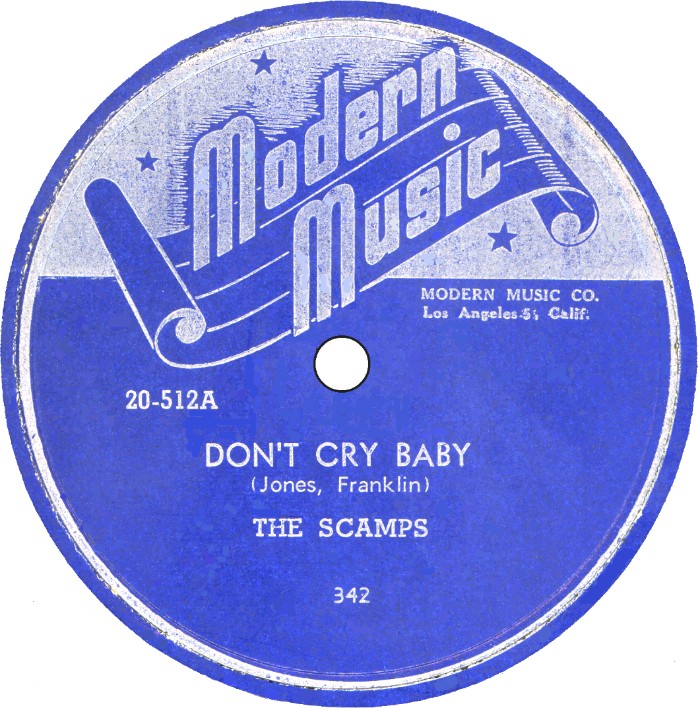
|
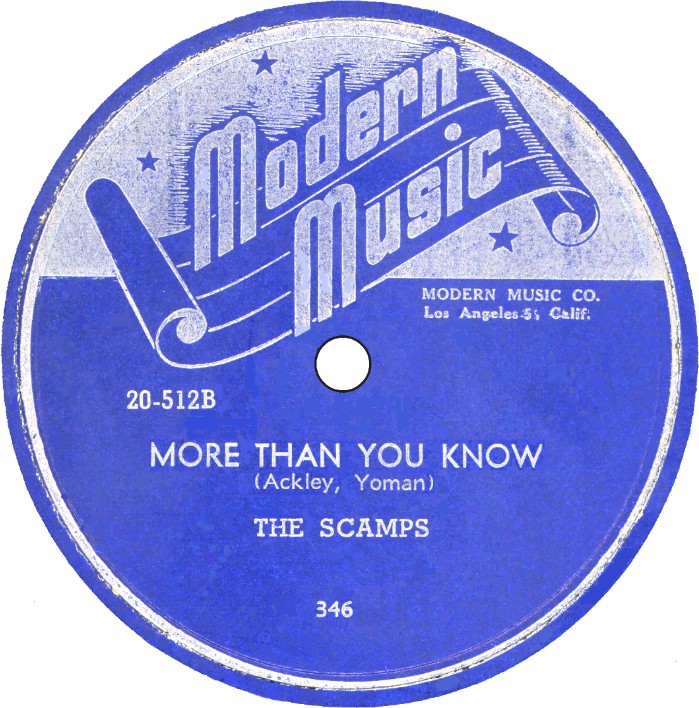
|
Above: Label images for both sides of Modern Music 20-512A/B, released in January 1947. Disco-File gives the members on this record as Torrence Griffin, Wyatt Griffin, Rudy Massingale, Earl Robinson, and James Whitcomb. This is their first record on the Modern Music label. Earl Robinson sings lead on both sides. The talking bass on "More Than You Know" and the very ending of "Don't Cry Baby" are reminiscent of The Ink Spots.
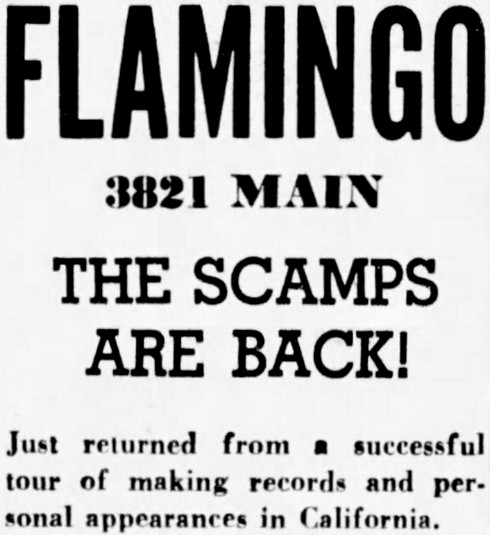
|
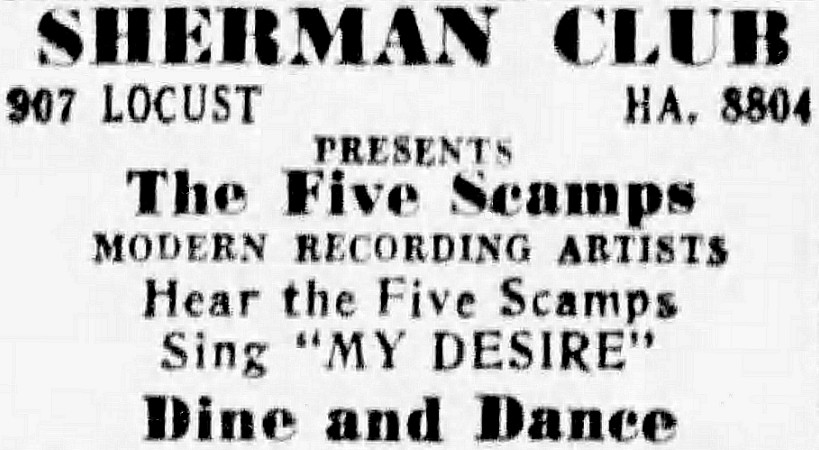
At Left: KANSAS CITY STAR, October 30, 1947. Above: KANSAS CITY STAR, March 27, 1947. ["Modern Recording Artists"] |
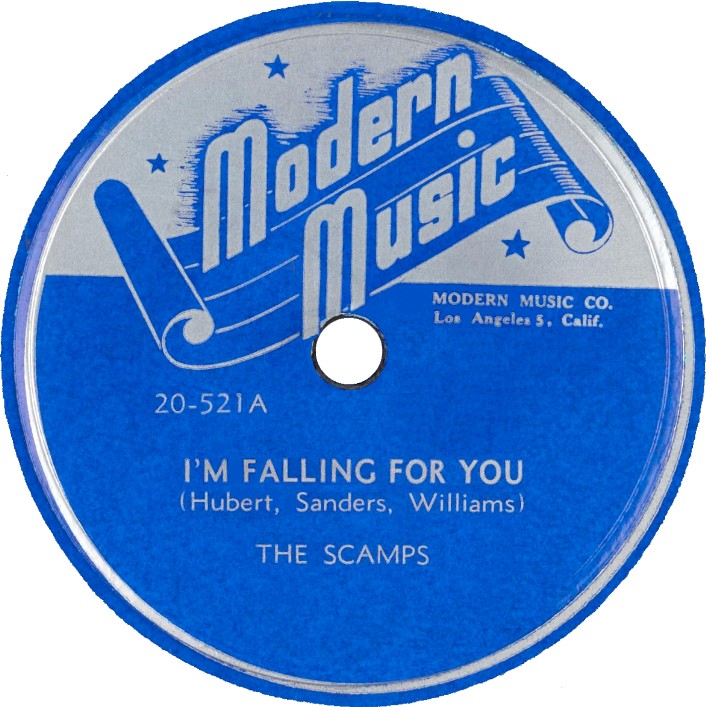
|
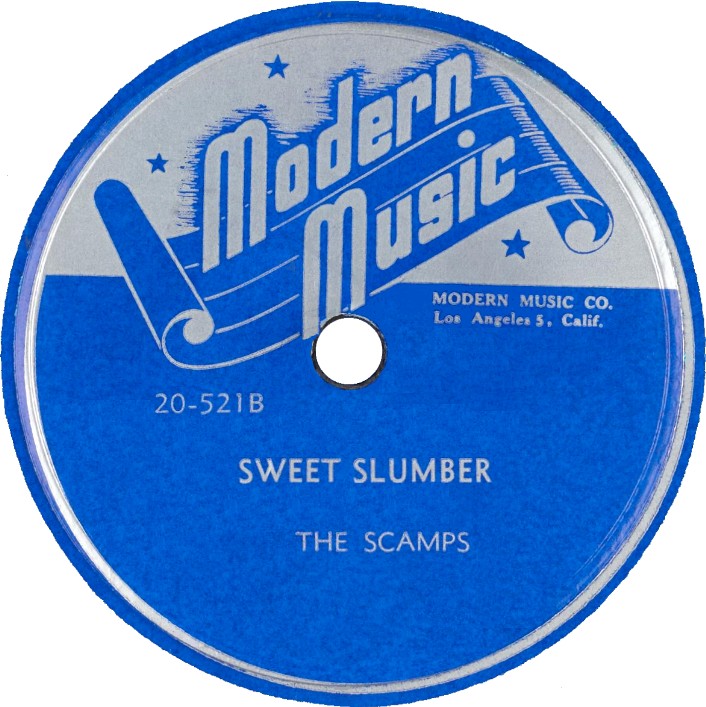
|
Above: Label images for both sides of Modern Music 20-521A/B, released in May 1947. Again, Disco-File gives the members on this record as Torrence Griffin, Wyatt Griffin, Rudy Massingale, Earl Robinson, and James Whitcomb. This is their third record for Modern Music. Again, Earl Robinson sings lead on both sides. Notice there aren't any composer credits on the "Sweet Slumber" label. The song had been previously released by Lucky Millinder And His Orchestra on Decca in 1944, with Trevor Bacon doing the vocal. Later, The Four Buddies released their version of the song on Savoy Records (1951) [This record is featured in the "Specialty Records - Part Three" article].
The Cash Box Review (8/25/47):
THE SCAMPS — Savoy 769.... "I'm Falling For You"/"Sweet Slumber"
A biscuit that has been pressed into something romantic, slow and soft, for those spots on your route where the customers like to hear that soothing wail of a good voice backed by neat piano playing. It's a really restful hunk of wax with both sides about equal. If you've got those dim lit tavern spots where they like their romance slow and easy, youíll do good with this disk.LISTEN (Windows Media Player): [Audio restoration by Dave Saviet.]
1. "Don't Cry Baby" - The Scamps - Modern Music 20-512A - 1947.
2. "More Than You Know" - The Scamps - Modern Music 20-512B - 1947.
3. "I'm Falling For You" - The Scamps - Modern Music 20-521A - 1947.
4. "Sweet Slumber" - The Scamps - Modern Music 20-521B - 1947.ALL FOUR SONGS played in sequence.
EXTRA RECORD — THE FIVE SCAMPS:
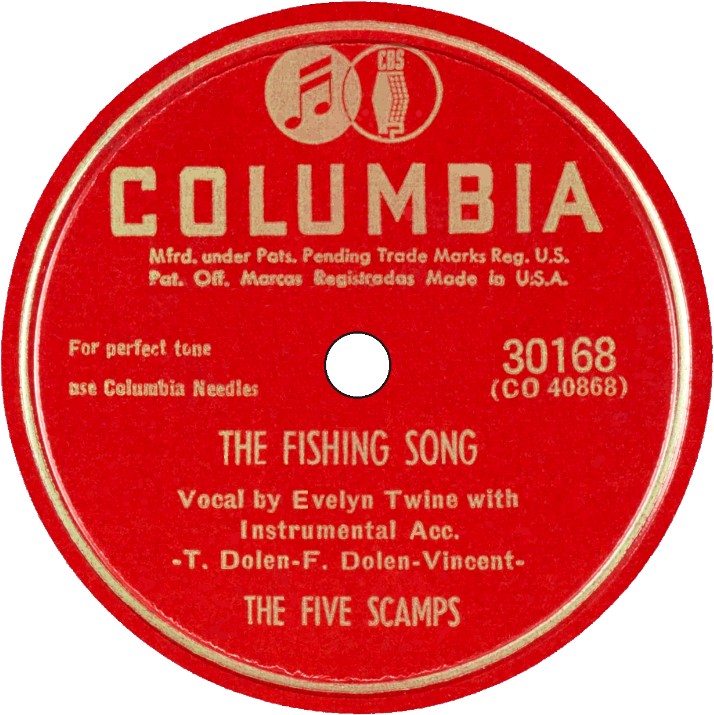
|
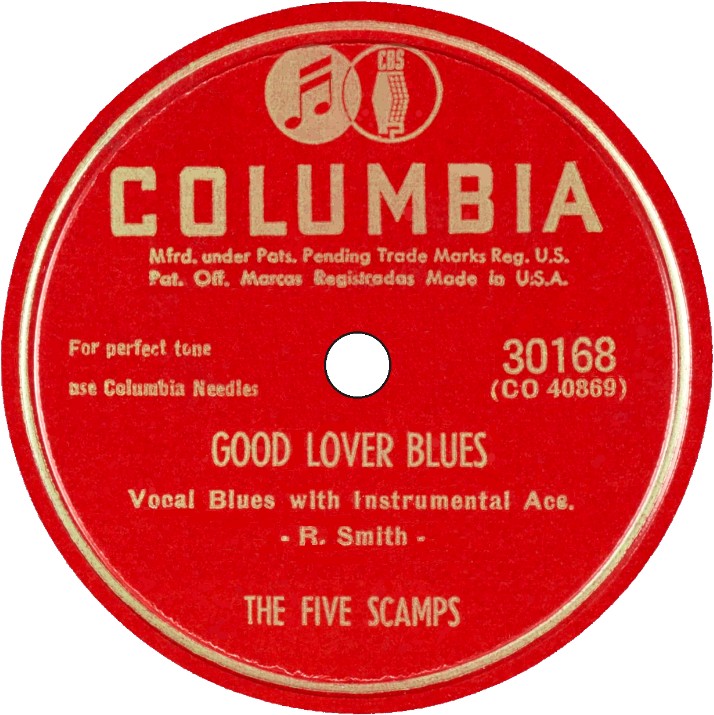
|
Above: Label images for both sides of Columbia 30168, recorded on June 8, 1949 and released that month. Evelyn Twine, who was Rudy Massingale's sister-in-law, became a full-time member of The Five Scamps in 1952. If you listen carefully, you'll hear Evelyn's surname mentioned in "The Fishing Song". The flip side, "Good Lover Blues", has neither Evelyn nor vocal group backing.
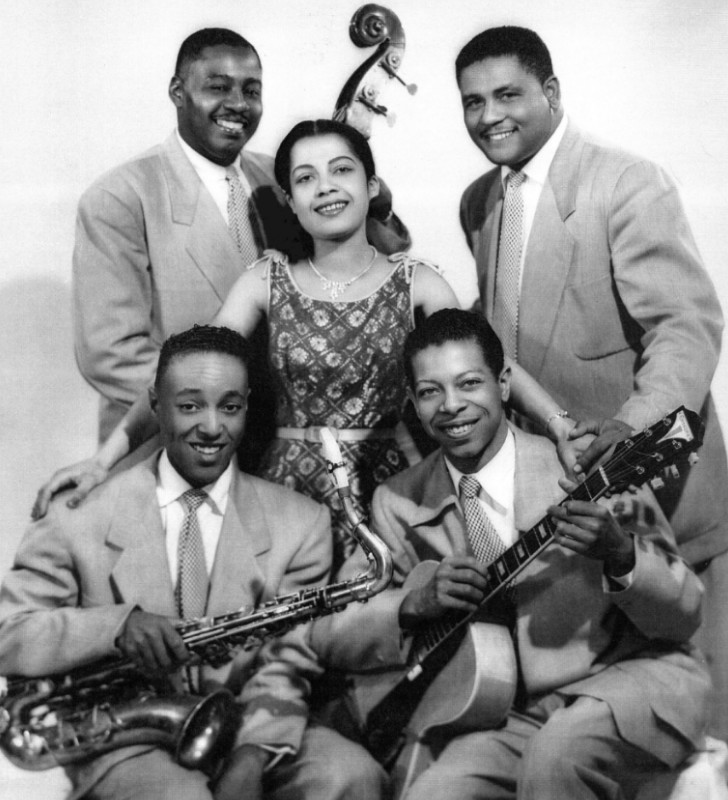
|
Above: 1952 photo of Evelyn Twine And The Scamps consisting of (L-R Back) James Whitcomb, Evelyn Twine, Earl Robinson, (L-R Front) Rudy Massingale, and Sonny Kenner. The actual line-up at the time of "The Fishing Song" is Evelyn Twine (lead), Rudy Massingale (piano, sax, vocals), Wyatt Griffin (guitar, tenor), James Whitcomb (bass fiddle, bass), Earl Robinson (cocktail drums, vocals), and Edward Stafford (trumpet, tenor).
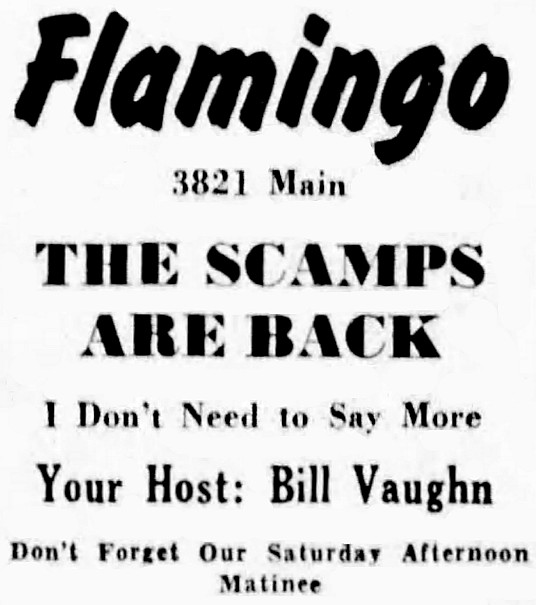
|

At Left: KANSAS CITY STAR, January 10, 1949.
Above: KANSAS CITY STAR, October 8, 1949. ["Evelyn Twine, Vocalist"] (NOTE: Their "Red Hots" name derives from their March 1949 Columbia record, "Red Hot".
|
LISTEN (Windows Media Player): [Audio restoration by Dave Saviet.]
1. "The Fishing Song" - Evelyn Twine And The Five Scamps - Columbia 30168 - 1949.
2. "Good Lover Blues" - The Five Scamps - Columbia 30168 - 1949.BOTH SONGS played in sequence.
EXTRA RECORD — MORE THAN YOU KNOW: The song "More Than You Know", written by Billy Rose, Edward Eliscu, and Vincent Youmans, was published in 1929. It was recorded many times over the years, including by Gene Mumford, Mildred Bailey, Count Basie, Ella Fitzgerald, Sarah Vaughan, Benny Carter, Billy Eckstine, and Billie Holiday.
The Al "Stomp" Russell Trio, based in Los Angeles, were a vocal and instrumental group. The trio consisted of Russell (piano), Joel Cowen (guitar), and William "Doc Basso" Joseph (bass fiddle). They recorded for several different record labels from 1945 to 1947.For Excelsior Records, they had a total of seven records released in 1945 and 1946, the first two backing up Timmie Rogers. In 1947, Joe Davis (bass fiddle) replaced "Doc Basso" and their name was changed to The Do Ray Me Trio.
Click HERE for an article about The Al Russell Trio/Do Ray Me Trio by Marv Goldberg.
(Will open in a separate window)
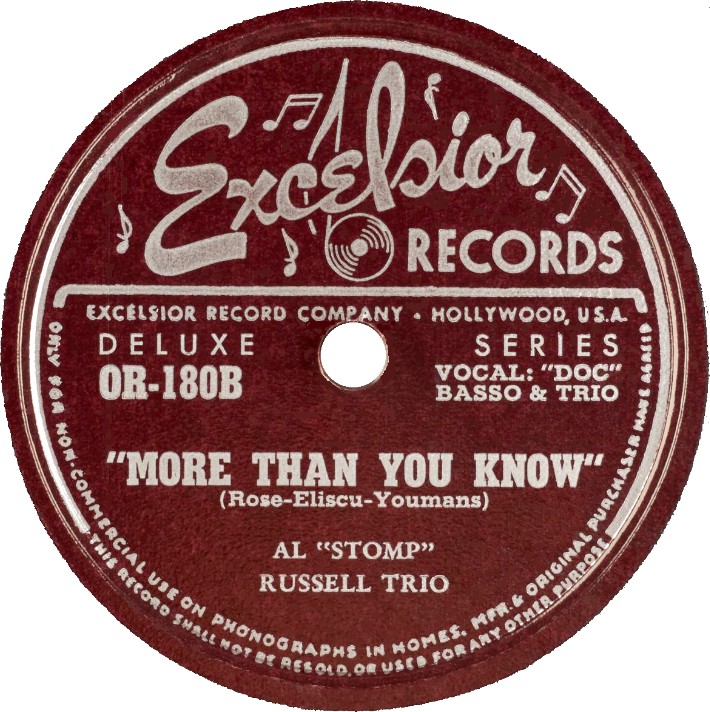
|
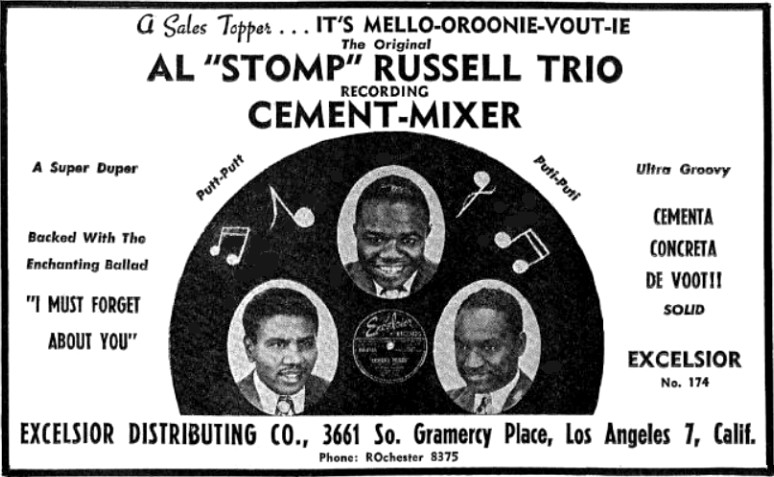
|
Above Left: Label image of Excelsior OR-180B, recorded on June 8, 1949 and released the following month. "Doc Basso" is the lead singer. The flip-side is "Dig Mr. K. Kay Kay", a controversial song at the time, even banned by some radio stations. Above Right: THE BILLBOARD, June 8, 1946.
NOTE: Shown are (Top) Al "Stomp" Russell (piano), (Bottom L-R) Joel Cowan (guitar), William "Doc Basso" Joseph (bass fiddle). All three were tenor singers.
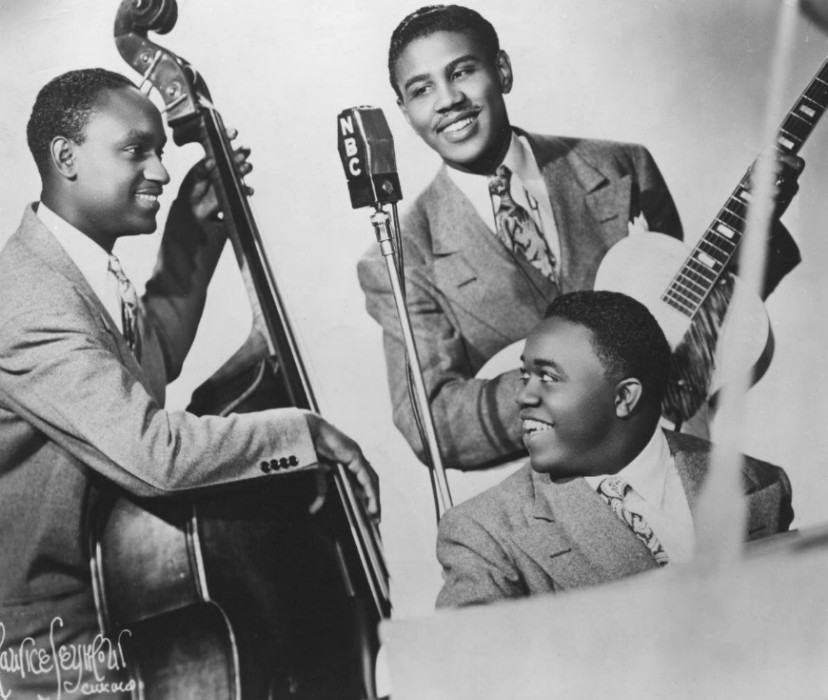
|
Above: Photo of The Al "Stomp" Russell Trio from the mid-1940's. (L-R) William "Doc Basso" Joseph, Joel Cowan, and Al "Stomp" Russell. They are all smiling, perhaps because they are being heard throughout the country on the NBC Network. [Photo courtesy of Paul Ressler.] THE BILLBOARD, May 4, 1946:
....Al Russell Trio is latest combo to sign exclusive contract with Excelsior....LISTEN (Windows Media Player): [Audio restoration by Dave Saviet.]
"More Than You Know" - Al "Stomp" Russell Trio - Excelsior OR-180B - 1946.
EXTRA RECORDS — I'M FALLING FOR YOU: The song "I'm Falling For You" was composed by Clarence Williams, Joe Trafalgar Hubert, and George Sanders. The first release of the song was by the Clarence Williams Trio on Vocalion in 1938. The label credits "Hubert" only. Earl Hines released a version on Bluebird in 1941 with the vocal by Billy Eckstein (aka Eckstine). All three composers are credited on that label.
The label for The Scamps' "I'm Falling For You" (see further above) also credits all three composers.
The Billy Samuels and Four Knights versions are featured here. These two record labels show only "Hubert-Williams" as the composers.
Bill Samuels was a singer, pianist, and composer. Bill Samuels And The Cats 'N Jammer Three, who were from Chicago, had eleven records on the Mercury label (1946-1947). The other members of this trio were Sylvester Hickman (bass fiddle) and Adam Lambert (guitar).
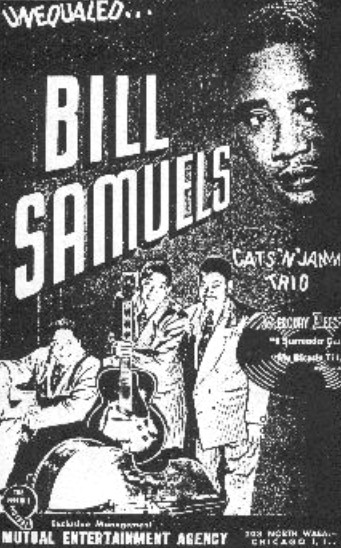
|
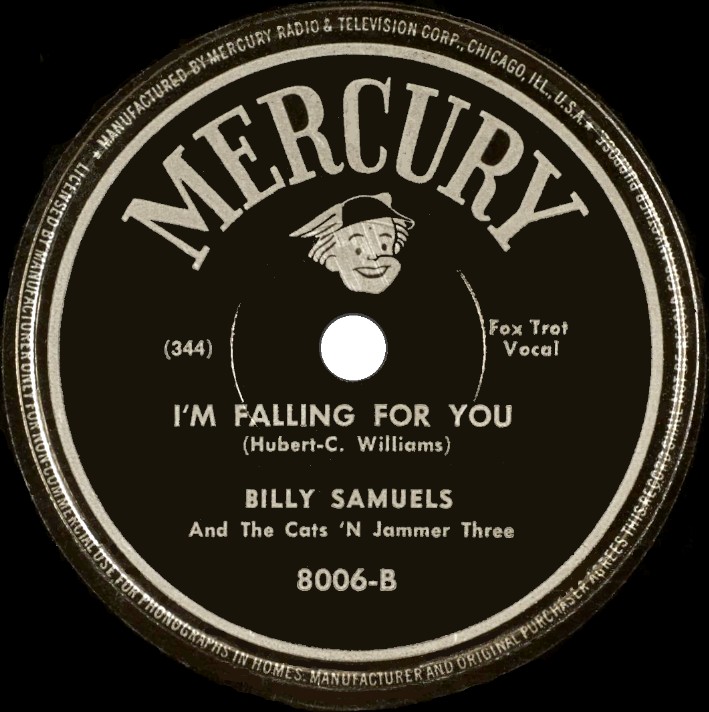
|
Above Left: THE BILLBOARD — 1947. Above Right: Label image of Mercury 8006-B recorded in April 1946 and released in May 1946. This is Bill Samuels and The Cats 'N Jammer Three's third record on the Mercury label.
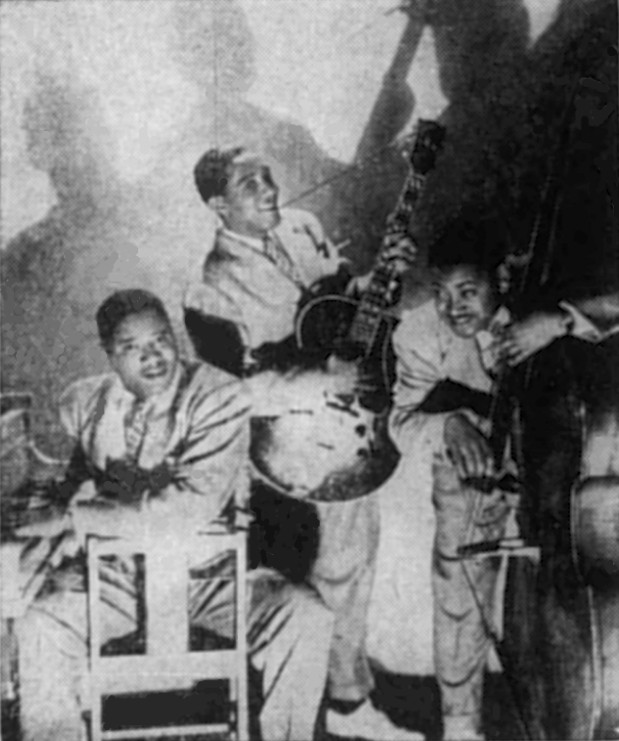
|
Above: INDIANAPOLIS RECORDER, April 12, 1947: THE SENSATIONAL BILL SAMUELS' CATS 'N' JAMMERS
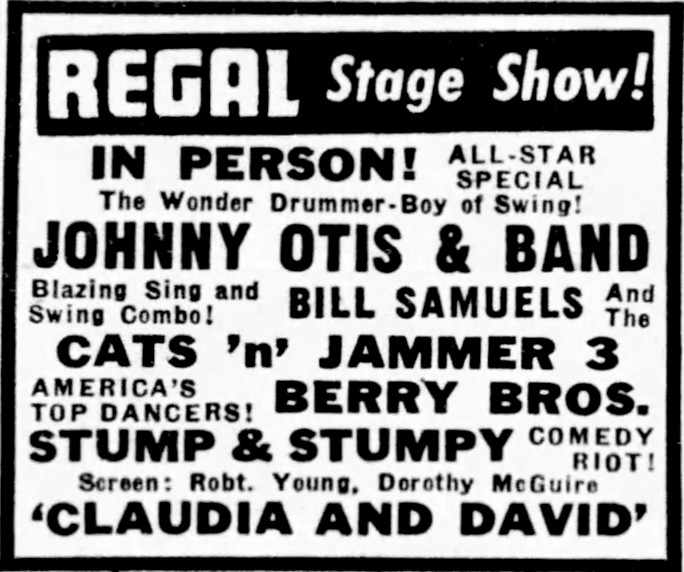
|
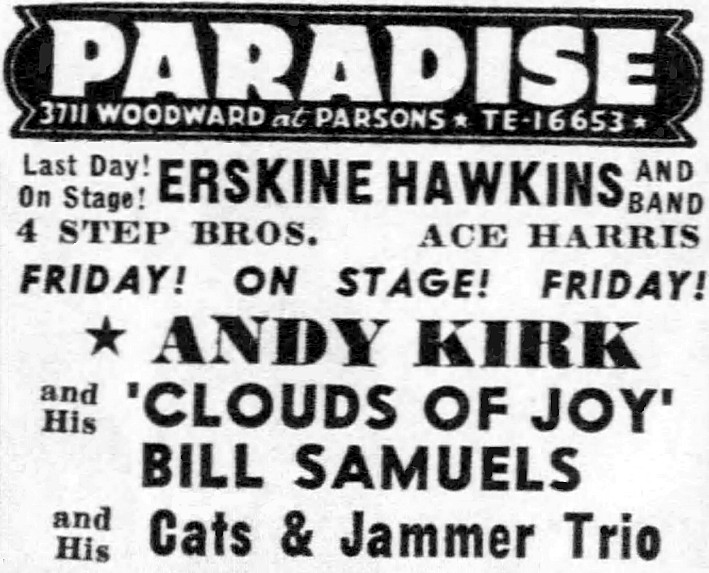
|
Above Left: CHICAGO TRIBUNE, November 25, 1946. Above Right: DETROIT FREE PRESS, February 27, 1947.
MINNEAPOLIS DAILY TIMES, May 23, 1946: BILLY SAMUELS AT HAPPY HOUR CAFE
The current Happy Hour floor show features Billy Samuels & Company in a brilliant turn of novelty entertainment. This act has appeared in scores of top flight night clubs throughout the country with great success....LISTEN (Windows Media Player): [Audio restoration by Dave Saviet.]
"I'm Falling For You" - Billy Samuels And The Cats 'N Jammer Three - Mercury 8006-B - 1946.
The Four Knights were Clarence Dixon, baritone; John Wallace, second tenor and guitar; Oscar Broadway, bass; Gene Alford, lead tenor and whistler extraordinaire. They were a spiritual and popular singing group. Much of their spiritual singing in the mid-1940s was done under the name "Southland Jubilee Singers".
Their first record was on Decca in 1946. They did many songs for Lang-Worth radio transcription discs from 1945 to 1950. The Four Knights were featured singers on the Red Skelton Radio Show from 1948 to 1950.
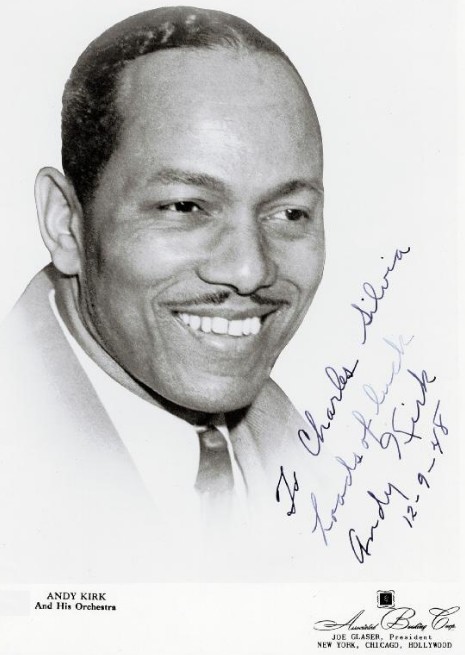
|
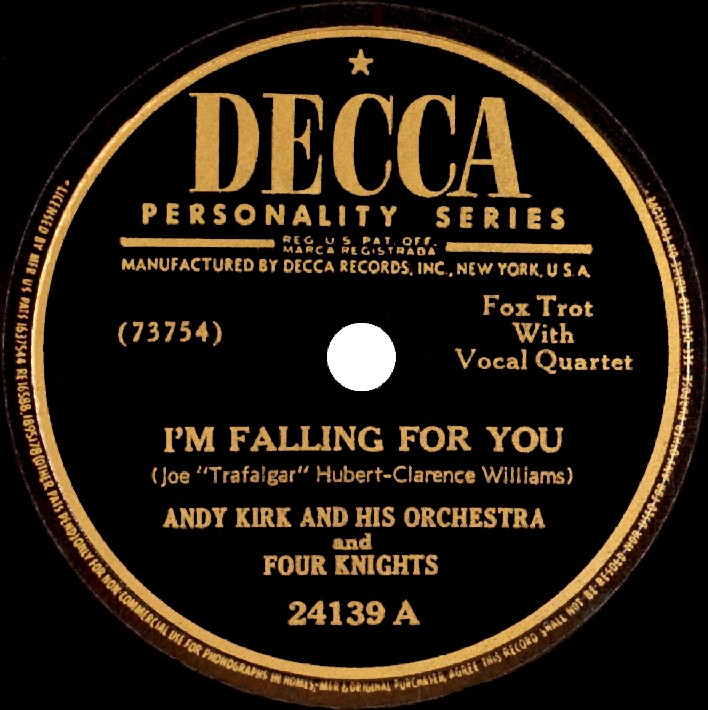
|
Above Left: Andy Kirk, the orchestra leader for this record. As usual, he gets top billing on the Decca label. Above Right: Label image of Decca 24139 A recorded on December 2, 1946 and released in August 1947. This is the last of six records The Four Knights had on the Decca label.
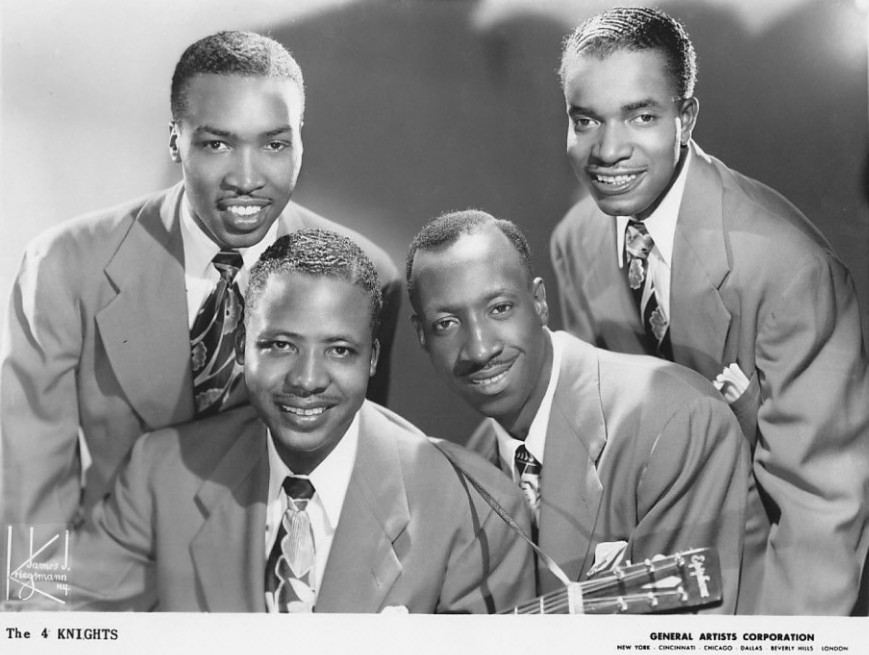
|
Above: Photo of The Four Knights (L-R) Clarence Dixon, John Wallace (with guitar), Oscar Broadway, and Gene Alford.
[Photo courtesy of Hans-Joachim Krohberger.]LISTEN (Windows Media Player): [Audio restoration by Dave Saviet.]
"I'm Falling For You" - The Four Knights And Andy Kirk's Orchestra - Decca 24139 A - 1947.
MODERN RECORDS - PART TWO FEATURES LILLIE GREENWOOD, LITTLE WILLIE LITTLEFIELD, PEE WEE CRAYTON, LITTLE ESTHER, SMOKEY HOG, GEORGE BLEDSOE AND THE MOON MISTS, THE SMITH JUBILEE SINGERS, AND MODERN RECORDS' COLONIAL LABEL.
MODERN RECORDS - PART THREE FEATURES HADDA BROOKS, THE EBONAIRES, JIMMY WITHERSPOON, HELEN HUMES, THE SONGS "BEWILDERED", "BE-BABA-LEBA", AND "THEY RAIDED THE JOINT", PLUS MISCELLANEOUS MODERN RECORDS' BLUES ARTISTS (ROY HAWKINS, CHARLEY BOOKER, ROBERT BLAND, MARY SUE).
MODERN RECORDS - PART FOUR FEATURES JOHNNY MOORE'S THREE BLAZERS, MARI JONES, FRANKIE ERVIN, OSCAR McLOLLIE, YOUNG JESSIE, JIMMY McCRACKLIN, JOHN LEE HOOKER, AND THE FOUR OF US. ALSO, THE SONGS "DRIFTING BLUES", "MY SONG", "C.O.D.", AND "I SMELL A RAT".
MODERN RECORDS - PART FIVE FEATURES JESSE BELVIN, THE CLIQUES, JIMMY BEASLEY, THE CADETS/JACKS, DOLLY COOPER, ETTA JAMES, THE COBRAS, FRED DARIAN AND THE DREAMERS, JIMMIE LEE AND ARTIS, THE SOUNDS, AND THE ROCKETS. ALSO, THE SONGS "NEAR YOU", "ROLLIN' STONE", "SIXTY MINUTE MAN", "I GOT LOADED", "STRANDED IN THE JUNGLE", "THE HENRY SONGS", AND "SINDY (CINDY)".
MODERN RECORDS - PART SIX FEATURES B.B. KING, THE NIC NACS, THE ROBINS, ARTHUR LEE MAYE AND THE CROWNS, DONNA HIGHTOWER (WITH VOCAL GROUP), JOE HOUSTON, ROSCOE GORDON, LIGHTNING HOPKINS, AND LUKE JONES. ALSO, THE SONGS "DON'T YOU THINK I OUGHTA KNOW" AND "SHTIGGY BOOM".
MODERN RECORDS - PART SEVEN FEATURES THE TEEN QUEENS, JIMMY NELSON, THE CHANTERS, CURTIS IRVIN AND THE SPARKS, BUDDY MILTON AND THE TWILIGHTERS, LITTLE GEORGE SMITH, THE FLAIRS, THE CHIMES, SHIRLEY GUNTER AND THE QUEENS, KAY BROWN (WITH VOCAL GROUP), BOBBY RELF AND THE LAURELS, AND MERCY DEE. ALSO, THE SONGS "EDDIE MY LOVE", "OOP SHOOP", AND "HEADIN' HOME".
MODERN RECORDS - PART EIGHT FEATURES RICHARD BERRY, THE DREAMERS, THE RAMS, WILLARD McDANIEL, THE DRIFTERS (CROWN), THE ORIGINAL JUBALAIRES, KAY BROWN, ELMORE JAMES, J.T. BROWN, AND B.B. KING. ALSO, THE SONGS "YOUR FEET'S TOO BIG", "I'VE WAITED ALL MY LIFE FOR YOU", "YOU WON'T LET ME GO", AND "LOVE ME".
Listen to all of this article's audio selections using Windows Media Player:
[Audio restoration by Dave Saviet.]
|
1. "Polonaise Boogie (Instrumental)" - Hadda Brooks - Modern Music 123B - 1946.
2. "Rockin' The Boogie (Instrumental)" - Hadda Brooks - Modern Music 113-A - 1945. 3. "The Man I Love (Instrumental-Celeste)" - Hadda Brooks, Tiny Webb, Basie Day - Modern Music 113-B - 1945. 4. "Bluesin' The Boogie (Instrumental)" - Hadda Brooks - Modern Music 114-B - 1945. 5. "Romance In The Dark" - Hadda Brooks Trio - Modern 150A - 1947. 6. "Romance In The Dark" - Lil Green - Bluebird B-8524-A - 1940. 7. "Romance In The Dark" - The 4 Blackamoors (Vocal By Mabel Robinson) - Decca 8512 A - 1941. 8. "Romance In The Dark" - Sarah McLawler - King 4561 - 1952. 9. "Romance In The Dark" - The Diamonds - Atlantic 1017 - 1953. 10. "Lonesome Gal" - Pearl Traylor - Modern Music 112-B - 1945. 11. "Daddy Somebody's Got To Go" - Pearl Traylor - Modern Music 114-A - 1945. 12. "The Pawnshop Man" - Pearl Traylor - OKeh 6822 - 1951. 13. "Come On Daddy" - Pearl Traylor - OKeh 6822 - 1951. 14. "I Used To Work In Chicago" - The Three Bits Of Rhythm - Modern Music MM118A - 1945. 15. "That's The Boogie" - The Three Bits Of Rhythm - Modern Music MM118B - 1945. 16. "Yas, Yas, Yas" - The Three Bits Of Rhythm - Modern Music MM137A - 1946. 17. "I'll Be True" - The Three Bits Of Rhythm - Modern Music MM137B - 1946. 18. "I'll Be True" - The Flennoy Trio - Excelsior FT-139A - 1945. 19. "The Duck's Yas Yas Yas" - The Three Peppers - Variety VA 590 - 1937. 20. "The Old Blues (Instrumental)" - The Three Bits Of Rhythm - Decca 8553 A - 1941. 21. "Bronzeville Jump" - The Three Bits Of Rhythm - Decca 8553 B - 1941. 22. "I'm Lonesome" - The Three Bits Of Rhythm - Decca 8572 A - 1941. 23. "This Is The Boogie The Woogie The Boogie" - The Three Bits Of Rhythm - Decca 8553 B - 1941. 24. "Big Fat Mama" - Gene Phillips And His Rhythm Aces (Vocal Backing By The Band) - Modern 20-519A - 1947. 25. "Big Legs" - Gene Phillips And His Rhythm Aces - Modern 20-527A - 1947. 26. "Fatso" - Gene Phillips And His Rhythm Aces (Vocal Backing By The Band) - Modern 20-546A - 1947. 27. "Rock Bottom" - Gene Phillips And His Rhythm Aces (Vocal Backing By The Band) - Modern 20-546B - 1947. 28. "58th Street Jump (Instrumental)" - Little Willie Jackson - Modern 20-547A - 1947. 29. "On The Sunny Side Of The Street" - Little Willie Jackson - Modern 20-547B - 1947. 30. "Lonesome Road" - The Commanders - Modern 20-567A - 1948. 31. "I'd Like To Know You Better Than I Do" - The Commanders - Modern 20-567B - 1948. 32. "Lonesome Road" - Valaida Snow And The Day Dreammers - Bel-Tone 7001 - 1946. 33. "Rock-A-Ma-Soul" - Paul Breckenridge And The Four Heavenly Knights - King 4182-A - 1947. 34. "I Shall Not Be Moved" - Paul Breckenridge And His Four Heavenly Knights - King 4192-A - 1947. 35. "Lonesome Road" - Paul Breckenridge And The Four Heavenly Knights - King 4182-B - 1947. 36. "Don't Cry Baby" - The Scamps - Modern Music 20-512A - 1947. 37. "More Than You Know" - The Scamps - Modern Music 20-512B - 1947. 38. "I'm Falling For You" - The Scamps - Modern Music 20-521A - 1947. 39. "Sweet Slumber" - The Scamps - Modern Music 20-521B - 1947. 40. "The Fishing Song" - Evelyn Twine And The Five Scamps - Columbia 30168 - 1949. 41. "Good Lover Blues" - The Five Scamps - Columbia 30168 - 1949. 42. "More Than You Know" - Al "Stomp" Russell Trio - Excelsior OR-180B - 1946. 43. "I'm Falling For You" - Billy Samuels And The Cats 'N Jammer Three - Mercury 8006-B - 1946. 44. "I'm Falling For You" - The Four Knights And Andy Kirk's Orchestra - Decca 24139 A - 1947. ALL FORTY-FOUR ABOVE SONGS played in sequence. ALL TWENTY-THREE ABOVE MODERN (MUSIC) LABEL SONGS played in sequence.
|
PREVIOUS ARTICLES/RECORDS OF THE WEEK!
Last Update: June 15, 2022
E-mail Me: